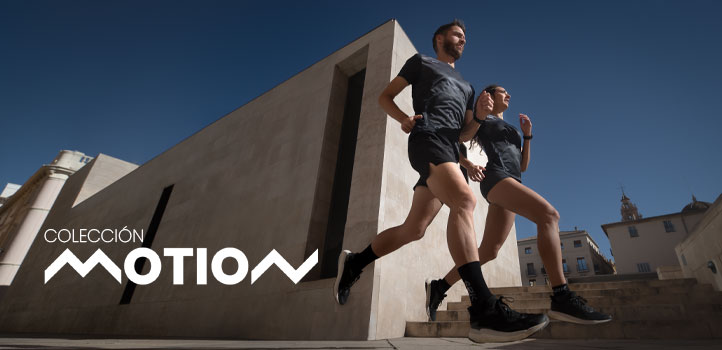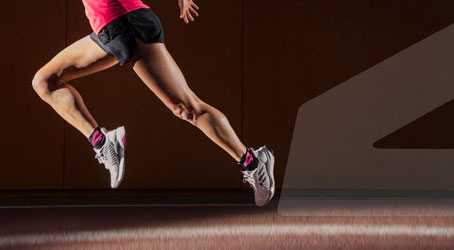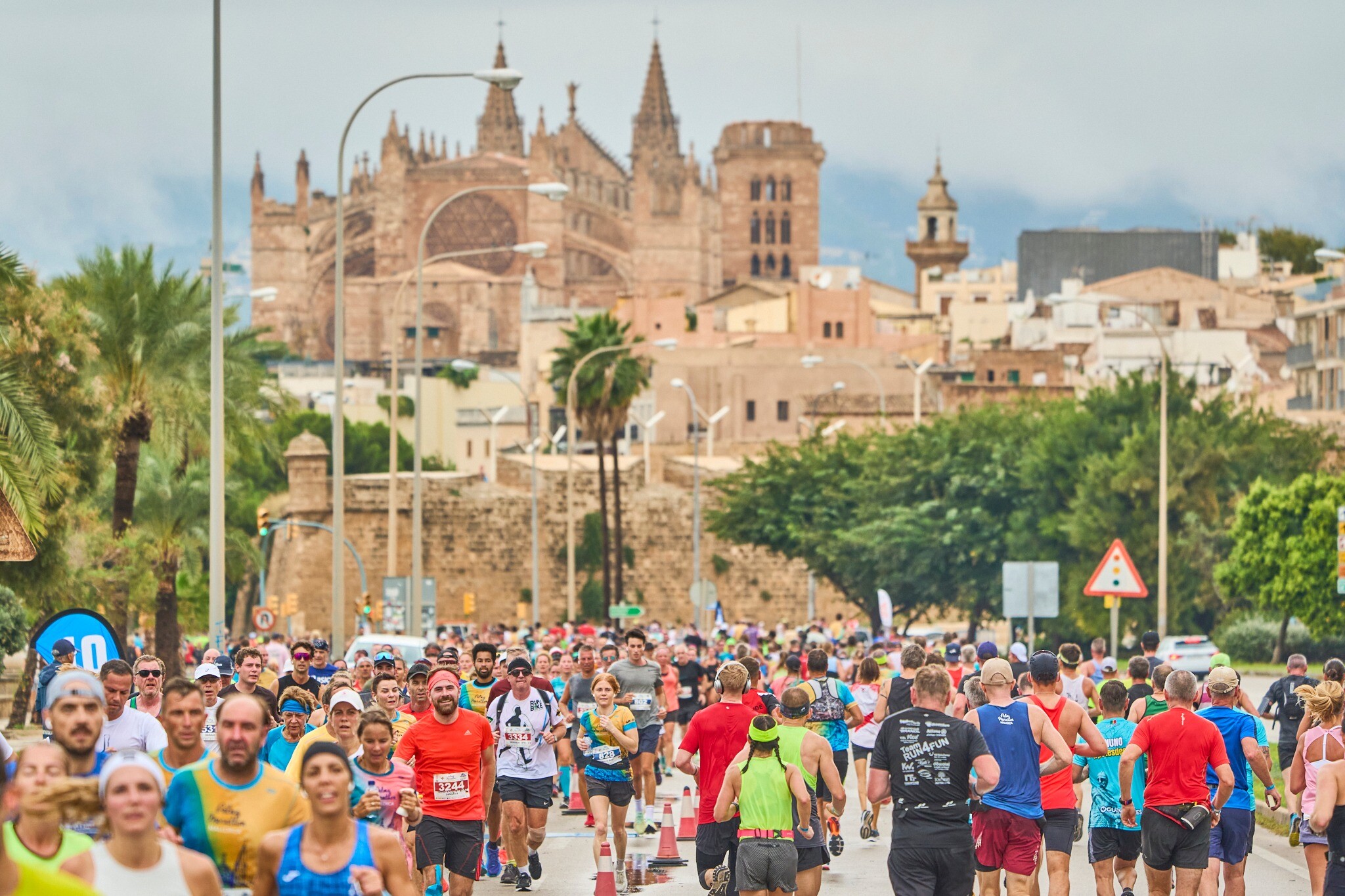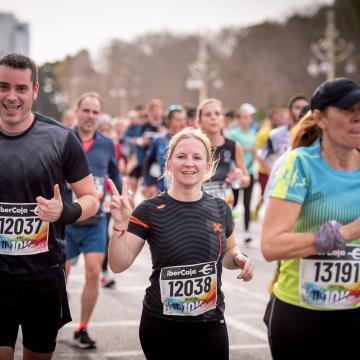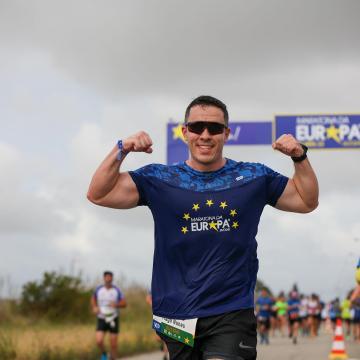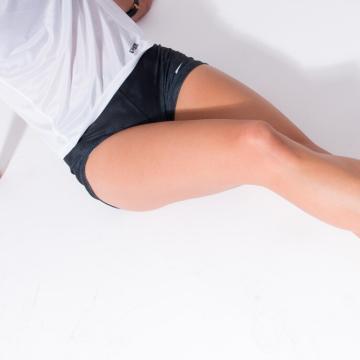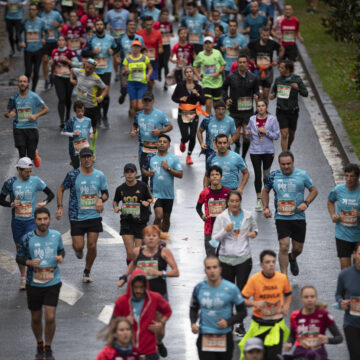Subscribe to our newsletter to find out about all the news and promotions, and automatically receive a welcome discount coupon in your email.
post -> 10 tips for your first marathon
The days before a marathon can be very stressful, especially for runners who are making their debut in the distance. In this article I am going to give you 10 tips for your first marathon, Especially for the days before and for the day of the race.
Preparing for a marathon requires a good training plan; a training plan adapted to the objective pursued in the race, previous experience in marathon distance, state of form, age... There are many factors that can be important when determining the most appropriate preparation to face a marathon with guarantees.
We are going to assume that you have completed the preparation and that, therefore, you arrive with your homework done in the days prior to your big date with the 42,195 kilometers. Behind you have left months of training, sacrifice and effort. The day for which your legs have traveled hundreds of kilometers is approaching, the day that seemed far away in time and that now you see so close.
You must be optimistic and think that all the hours and all the kilometers of effort and dedication are going to pay off, but It is important that you do not make last minute mistakes (in the last days and on the day of the race) that could compromise the work done for months. Below I am going to list 10 tips for your first marathon that will help you avoid making mistakes.
The first of the tips for your first marathon: rest and disconnect the days before
In the days before the marathon you should try don't stress your body anymore and give priority to rest and disconnection.
If you have been rigorous and constant with the preparation, you have to be confident and seek peace of mind. It is the time of Tapering or set-up. You have to change the “I have to get up to train” by “I have to sleep more”; forget the gym and visit the physio to give you a muscle relief massage on your legs; Dedicate time to family or leisure and don't think about training anymore.
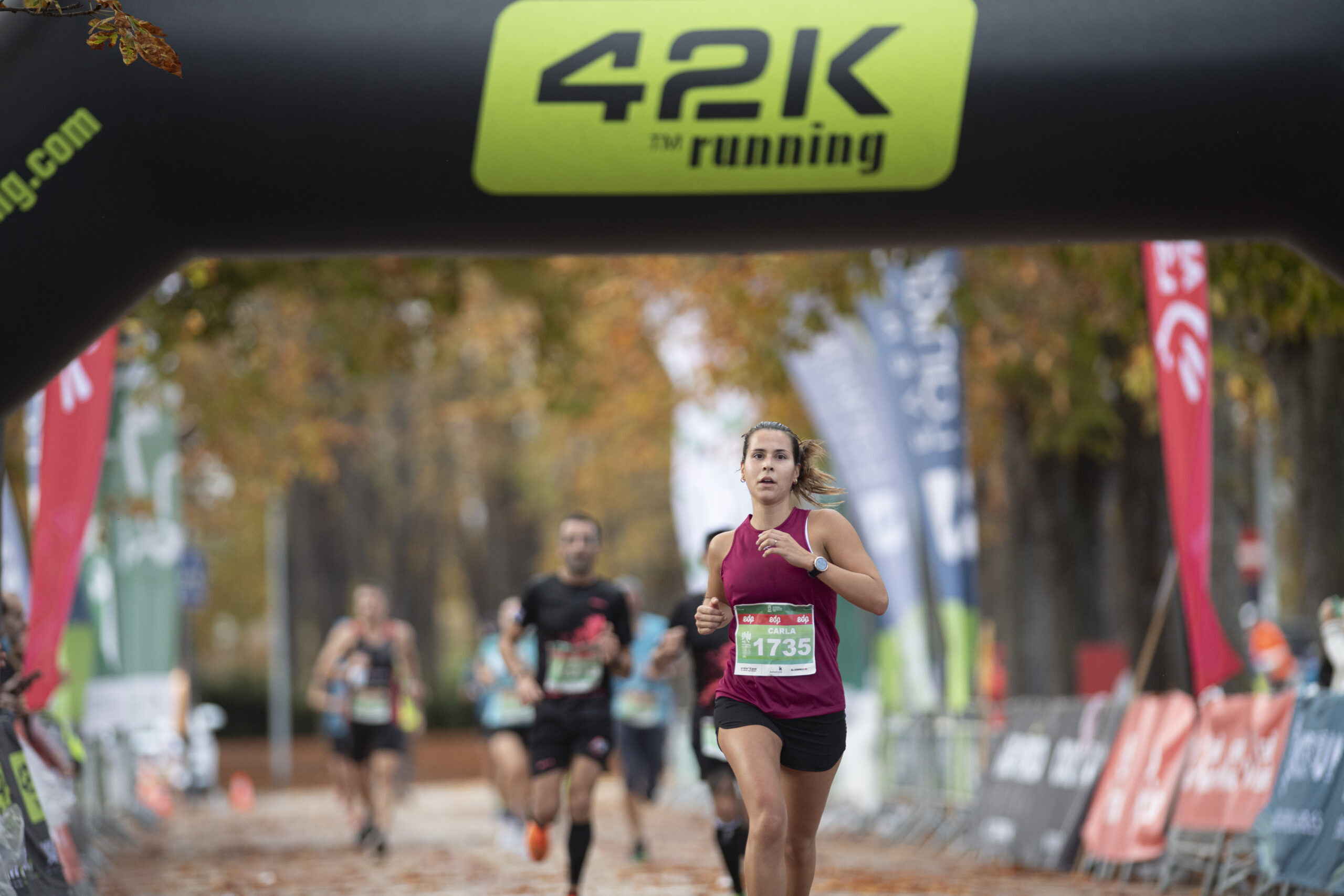
Every runner wants to arrive in the best possible performance conditions on the big day and to help you I offer you 10 tips for your first marathon. These tips for the days before and on the day of the race are valid for any runner, also for beginners:
- Don't train anymore.
- Study the weather forecast.
- Avoid staying cold on the way out.
- If you can, train at the same time as the test.
- Avoid excessive carbohydrate loads the days before.
- Eat and drink what you have trained.
- Follow the rhythms you have planned and trained.
- On race day nothing is improvised and nothing is released.
- Pay attention to small details.
- Your fans must wait for you in the final ten kilometers.
Don't add last minute training
1. Do not train more than planned by your coach. The sessions, competitions, lengths or series that you did not do are already behind you and it is not the time to recover them. Don't think about what you “could have done.” In the week before, additional training will not make you perform more or better on the day of the marathon; however, one session less may do the trick. The really important thing now, when you are just a few days away from the big date, is to arrive rested at the start. Trust what you have trained!
2. Check the weather forecast and temperature in the city where you are going to run. It is important that you know what the average temperature is at the start time and what temperature it will reach during the race (in the Valencia marathon, for example, in the month of December the average temperature at the start is 9º). -13º, reaching 17º-20º maximum). It is also advisable that you take into account the relative humidity or if there is a forecast of rain to avoid surprises.
The humidity thing is not nonsense because for a person used to training in a dry climate it can be a significant handicap to run a marathon in a more humid city or region since it will require a special hydration strategy. I'll give you a concrete example: if you live in a dry region and decide to run the Valencia marathon, which is a city with an average relative humidity of 60%-63%, I recommend that you raise your hydration levels 2-3 days before the race at 2-3 liters per day.
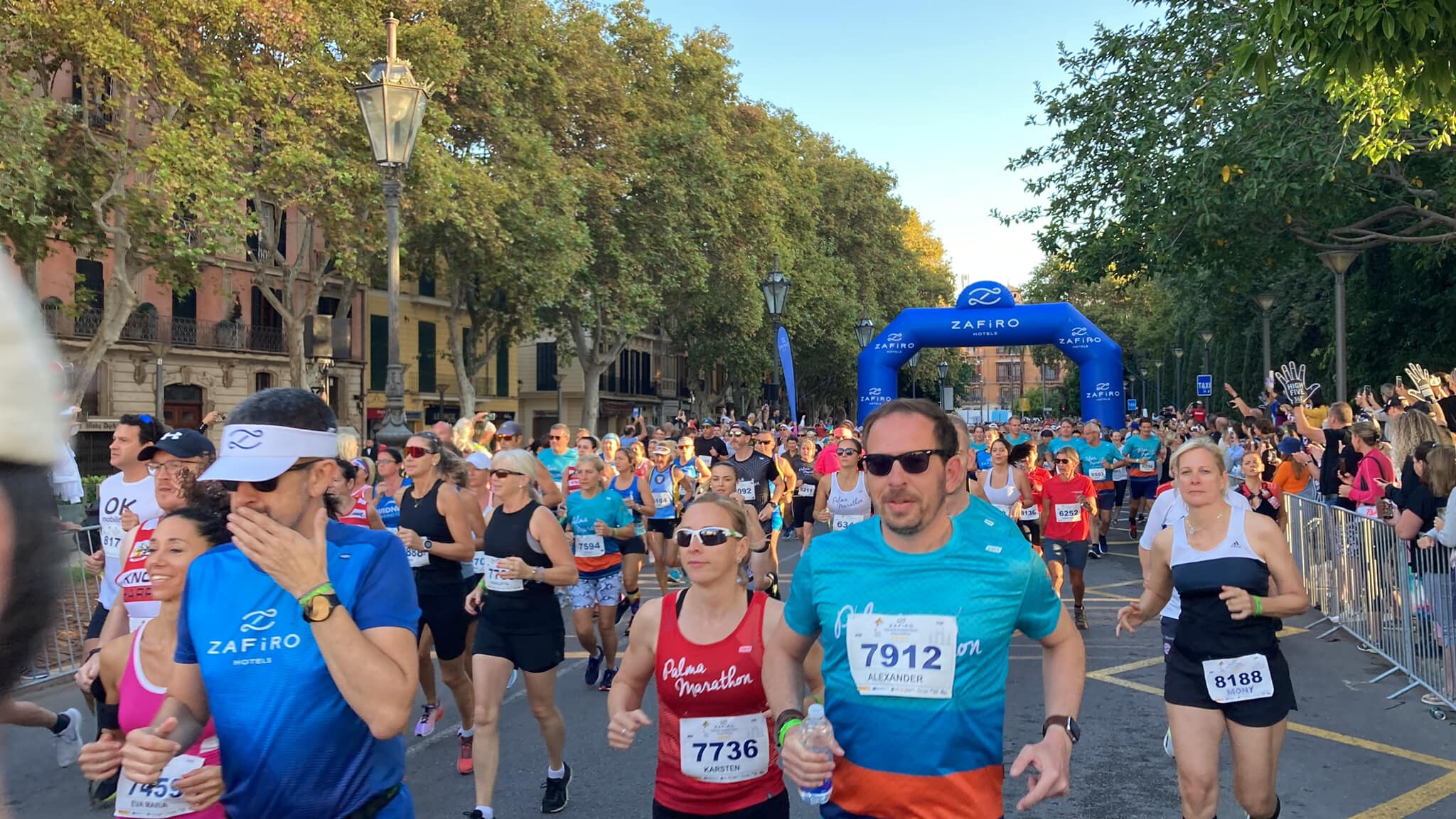
3. Avoid staying cold on the way out. Don't forget some clothing to keep you warm until the moment you start or until you have warmed up a few kilometers after starting to run. There are races in which it is possible to get rid of these clothes at the start or even later and that have a charitable purpose, as the organization of the Valencia marathon does, which collects all these clothes and donates them to an NGO.
4. Train at the same time as the marathon. If possible, it is recommended that you train at the same time that you are going to have to run on race day. Our body is like a “repetition machine”, capable of adapting and memorizing any routine. If due to personal or work circumstances you cannot train at the time of the test, go out for a light jog of between 20 and 30 minutes the day before the race, at a time similar to the start of the test; This way you will get your body activated the next day without problems.
5. Avoid excessive carbohydrate loads in the previous days. The belief is too widespread that it is essential to gorge on carbohydrates 48 hours before running a marathon. My advice is to avoid excessive and uncritical 'carbohydrate loads' in the days before. It has been shown that these diets are not as effective as was believed and that can cause gastrointestinal problems to many runners and runners.
Start race day with your regular breakfast (not a breakfast with “extras” for the race) and do not leave your stomach empty until 90 minutes before to start running. Bring something to eat and drink until there are 90 minutes left before departure and this way you will avoid feeling hungry or feeling 'empty' or 'lacking strength'.
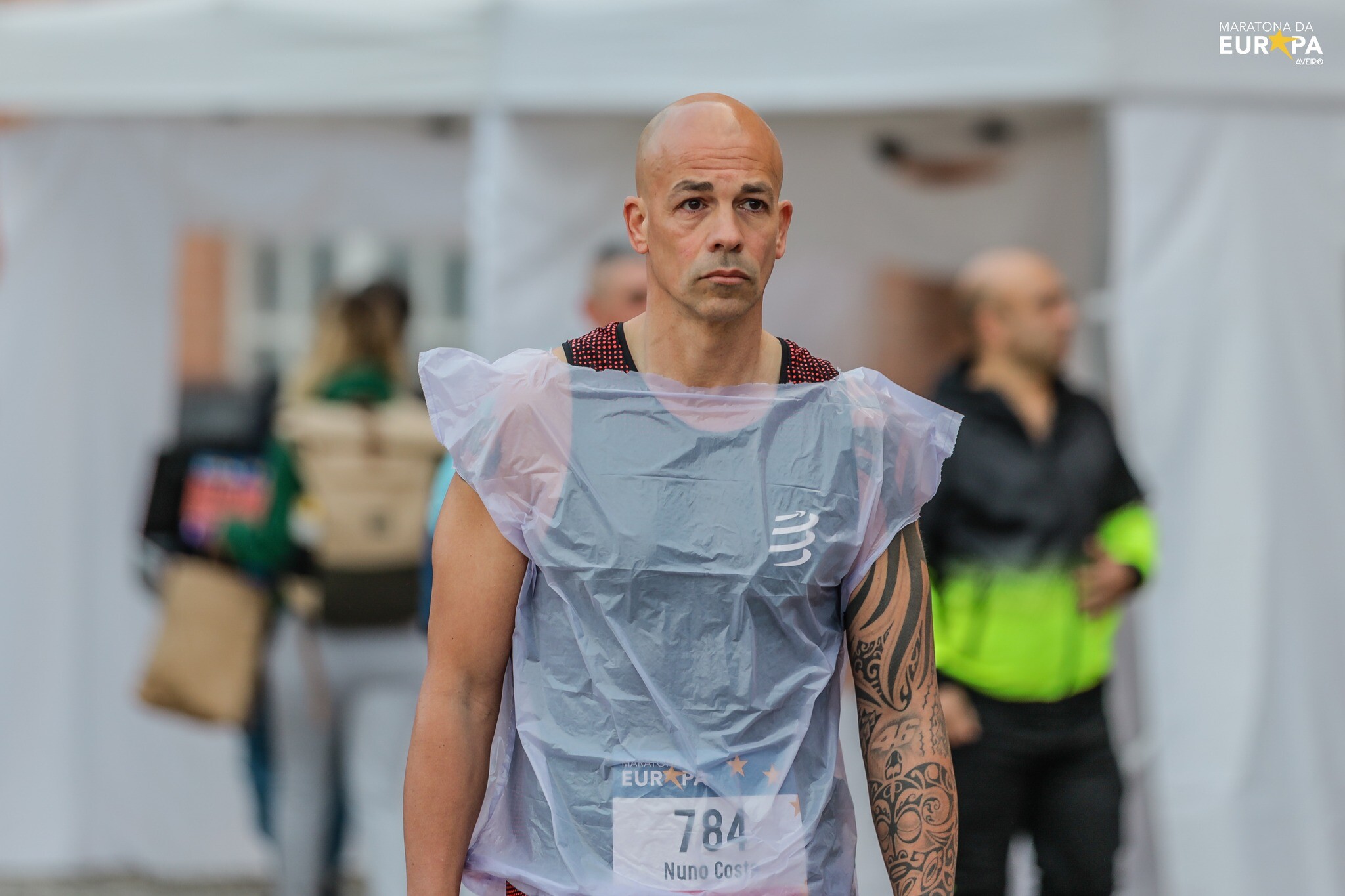
On race day don't improvise with the alimentation, hydration or rhythm
6. Eat and drink what you have trained. One of the most important tips I can give you for your first marathon is to
the day of the race you don't have to improvise with thelimentation and hydration. Repeat the supplies you have rehearsed in training; stick to what you know has worked well for you in training and don't make last minute changes. The marathon is a race that is very tiring and pushes you to the limit, so you cannot allow yourself "experiments" that you do not know how they will affect your performance.
Something that I consider important to note is that many marathons have a sports hydration/nutrition brand as a sponsor or collaborator and they offer their products at the aid stations. Find out what that company is and try if those products work well for you, if you intend to use them in the race. Otherwise, continue with your personal supplies and do not eat or drink more or less than what you have planned, trained and assimilated.
It is quite common to want to eat more than necessary hoping to perform better or, on the contrary, not reach the recommended intake due to the nerves and anxiety generated by the marathon. Eat when you are not hungry and drink before thirst appears It is the key to not having energy and/or hydration problems.
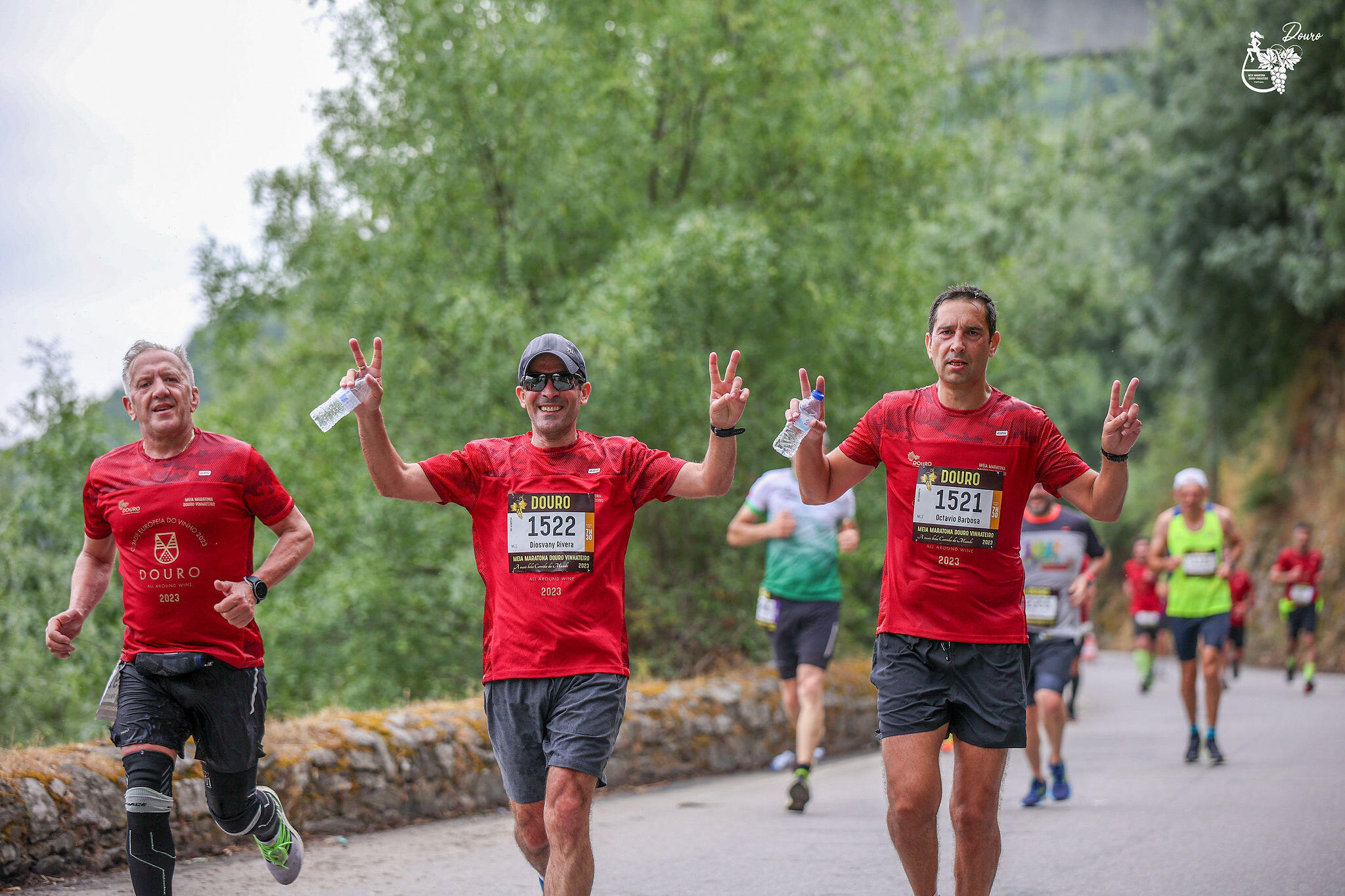
The marathon begins when crossing the starting arch, not at Km30
7. It is ESSENTIAL to follow the planned and trained rhythms and/or heart rate. You are facing a race of several hours, so you have to think that the sensations you have at kilometer 5 may be very different from those at kilometer 25. Try to be very rigorous in monitoring your rhythms and/or heart rate. planned and trained for the race; Do not get carried away by the pace of other runners because the race is very long and you will lose control (relative) of fatigue.
Among the tips for your first marathon, I also consider it important to tell you that you have the very cold head in the first kilometers of the race to avoid sudden changes in pace that usually occur in the first 3-4 kilometers. Those sudden changes of pace can wear you down more than you imagine and take their toll on you in the end. Focus on running at the pace you have planned from the start and don't mind being passed by other participants on the right or left; you have to do your race from start to finish.
It is a very common mistake in the first kilometers to run at a faster pace than expected, either due to nervousness, the excitement of the marathon, or the effect of the tapering, etc. These excesses, once the race is advanced, can cause a situation of excessive exhaustion with many kilometers to go. This state is not reversible and there is no other alternative than to lower the intensity and not lose focus on arrival.
The marathon does not start at Km30, as they say; What you do from Km1 already conditions everything that will happen later. The marathon begins when you pass through the starting arch: keep this idea as one of the main tips for your first marathon.
8. Don't improvise or try anything new. Don't experience race day! This is one of the most important pieces of advice for your first marathon that I can give you and you will surely have heard it from all the trainers or coaches in the world.
the day of the race You should NOT wear brand new sneakers, socks, pants, t-shirt... Of course, You should NOT try new isotonic and/or energy drinks; Don't try any radical diets in the last few days (even if so-and-so or so-and-so did wonderfully in a previous marathon).
Another piece of advice for your first marathon that I consider necessary to highlight is the importance of not doing training with new teammates the week before the race (I have seen this many times in my years as a trainer). Absolutely everything must be tested at least 15 days before.
Tips for your first marathon, practical aspects of great importance
9. Pay attention to the small (big) details. Among the tips for your first marathon I also find it interesting to point out practical aspects which may seem of little importance but they have a lot of importance in a 42 kilometer race.
To begin with, pay attention to your feet and take care of them during the week before the race. As a first measure, I would tell you that the days before the race, wear comfortable shoes to avoid chafing or blisters that could bother you on the day of the marathon. If you have to cut the nails, let it be four or five days before the race (never the day before). And he also thinks about the scratches; If you are prone to it, you can use Vaseline but only on the specific areas of the foot where friction is generated (do not abuse Vaseline on your feet or other parts of the body because it is not absorbed and can cause increased sweating).
More tips for your first marathon: anticipates any inclement weather, prepare everything in time the day before and don't leave things for the last minute (such as placing your number, preparing your supplies or preparing the clothes you are going to run in), go ahead and get your number (if it is the same day as the race), avoid stressful situations and use Vaseline sparingly for critical chafing points (armpits, groin...).
Lastly, Don't worry if you can't sleep the night before (it is very common and does not only happen to beginner runners), since the important rest is a night's sleep 48 hours before.
10. Ask your "supporters" to wait for you after Km32. Up to Km25 the marathon is “easy”. From Km25 to Km32 you will face the hardest part on a physical level. From Km32 onwards the countdown and the psychological marathon begin. If you have supporters individuals (family, friends, club mates...), ask them to be within the last 9-10 kilometers to give you the necessary moral support. The applause and encouragement from familiar faces along with the visualization of reaching the finish line will push you to success, for sure.
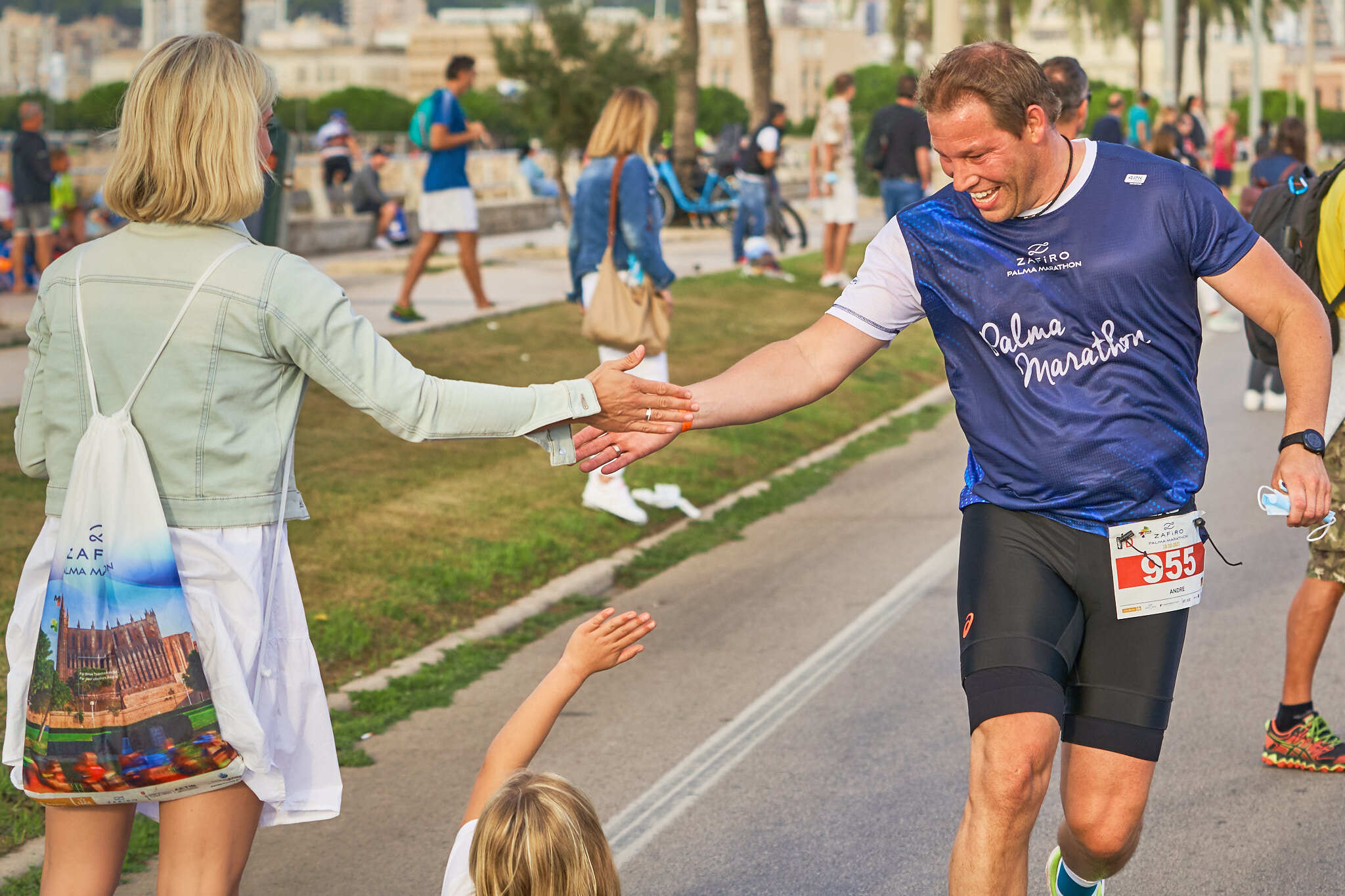
I hope these 10 tips for your first marathon are useful to you.
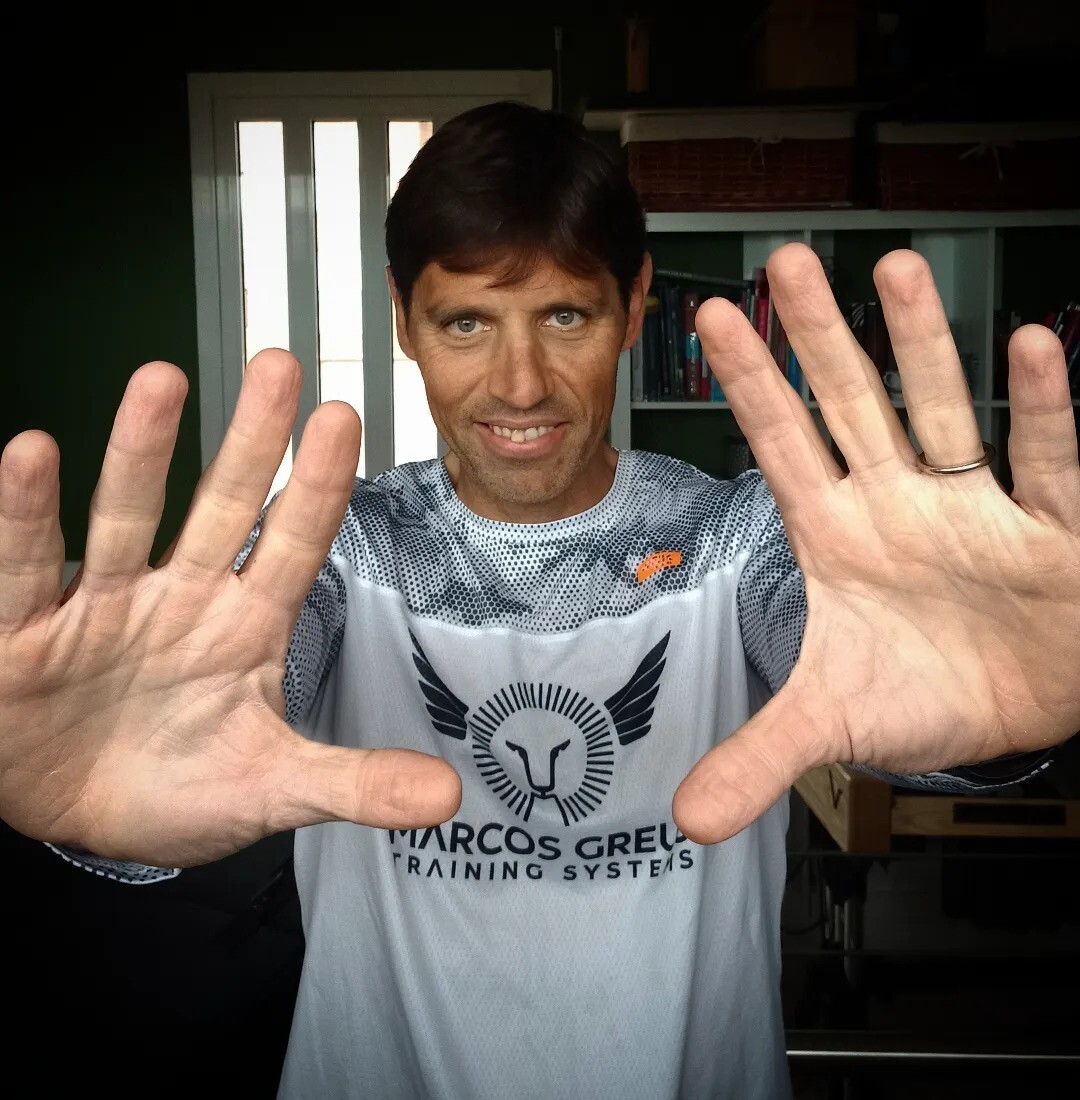
Health and kilometers!!!!
The COO (Chief Operating Officer) of 42KJulio Mas, was one of the more than twenty thousand runners who competed in the Athens Marathon on November 12 and has told us in first person about his experience in the oldest and also the most legendary marathon in the world.
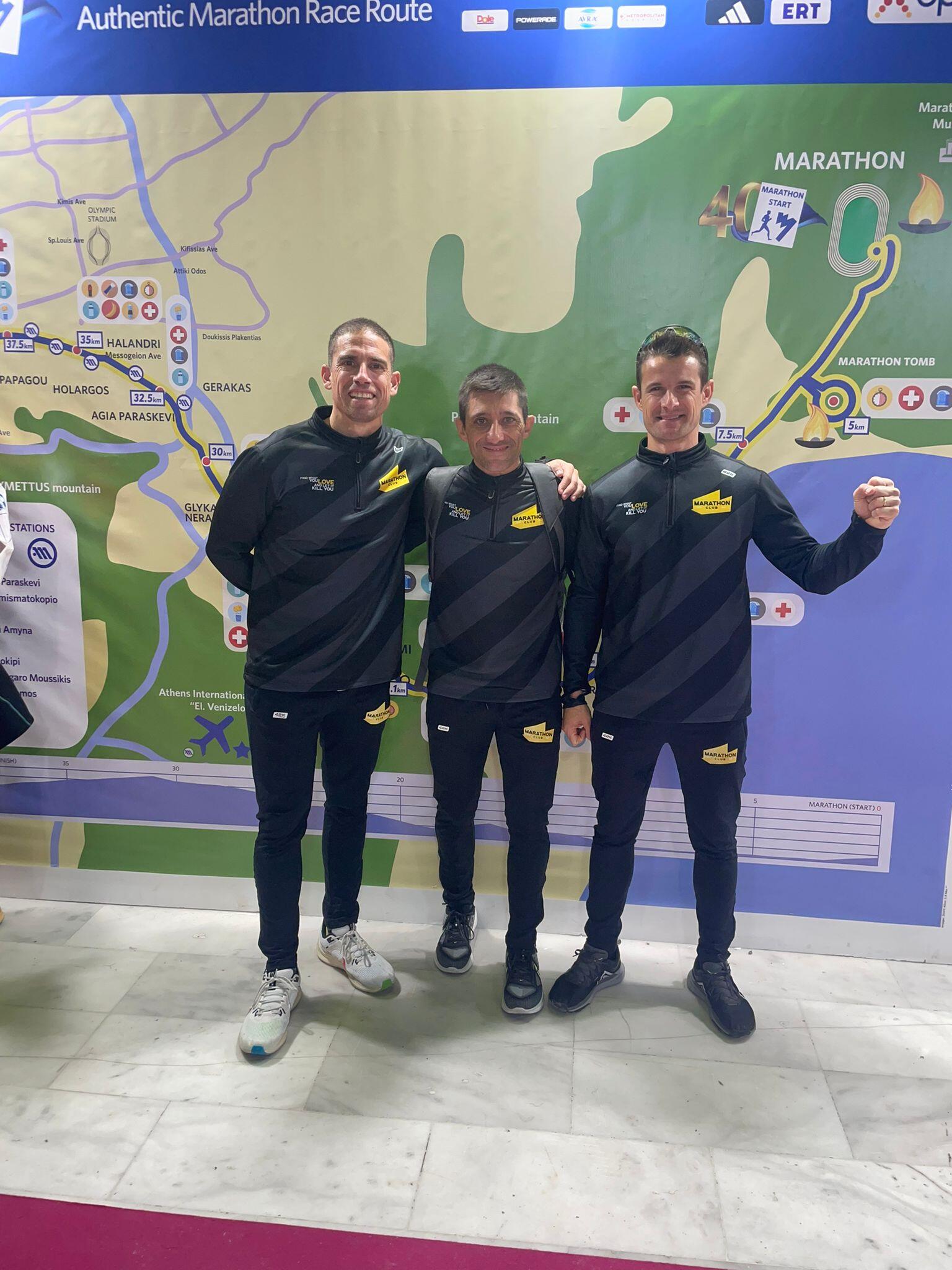
I started running about 30 years ago, at a time when the word “” was not used.running”, when at the start of any marathon in Spain there were no more than a thousand runners (and very few women) and when running through any city attracted attention and attracted looks of surprise and strangeness.
I have lost count of the races in which I have defended a number (I do not forget the first, the Volta a Peu València, when I was 14 years old), but I remember each of the marathons that I have run because I have put my soul into all of them.
The marathon is a unique test and I have always believed that it must be run with enormous respect and that, in my opinion, means doing it with the maximum personal ambition and with the determination to exhaust every last gram of strength.
I have completed the 42,195 kilometers 14 times and, fortunately, I have only experienced the disappointment and ingratitude of withdrawal once, in Seville (2014), although that is also part of the greatness of this test. Preparing for a marathon means training for months knowing that On race day you risk everything on one card and you are never safe from an injury, a fall, a stomach problem...
Competing in the Athens marathon, a dream come true after 30 years of running
I made my marathon debut in 2005, in Valencia. Since then this career has been part of my sporting life and also, to a large extent, of my professional life as commercial director of 42K, since our sportswear brand has been and is the technical brand of countless marathons in Spain, Italy, Ireland, Portugal, France...
I have been lucky enough to experience the marathon as a runner in wonderful settings: Valencia (eight times), Barcelona (twice), Paris, Rome and Stockholm. But ever since I fell in love with the marathon, I dreamed of one day competing in the legendary Athens Marathon.

After many years cherishing that dream, finally in 2023 I was able to be at the start of the town of Marathon to face the most historic, the most mythical and, without a doubt, the hardest of the great marathons. I'll tell you my experience in it. 40th Athens Marathon and I encourage you to one day experience firsthand the indescribable sensation of glory that is felt when crossing the finish line at the Panathenaic Stadium in Athens.
Athens Marathon, a unique atmosphere
The Athens Marathon It has the weight of history and legend behind it, something that is felt in the atmosphere that exists in the Greek capital in the days before the race. When you exchange glances with other runners in the most touristic places in the city, you realize that you share a mixture of excitement and nervousness, which is logically the result of knowing that you are in a mythical place and that you are going to face a unique marathon.

Athens turns to the marathon and you can breathe marathons throughout the city. It is their big sporting event of the year and they pamper it in a special way. The percentage of foreign participation is very high and that translates into enormous economic income for hotels, restaurants, commerce...
The Athenians experience the celebration of the race with joy and tremendous pride. They feel very lucky to be the origin of the authentic marathon; They like to breastfeed and remember that they are the classic marathon cradle, 'the authentic', as it appears on all the official posters and advertising of the event, and is even engraved on the finisher's medal (see in the photo).
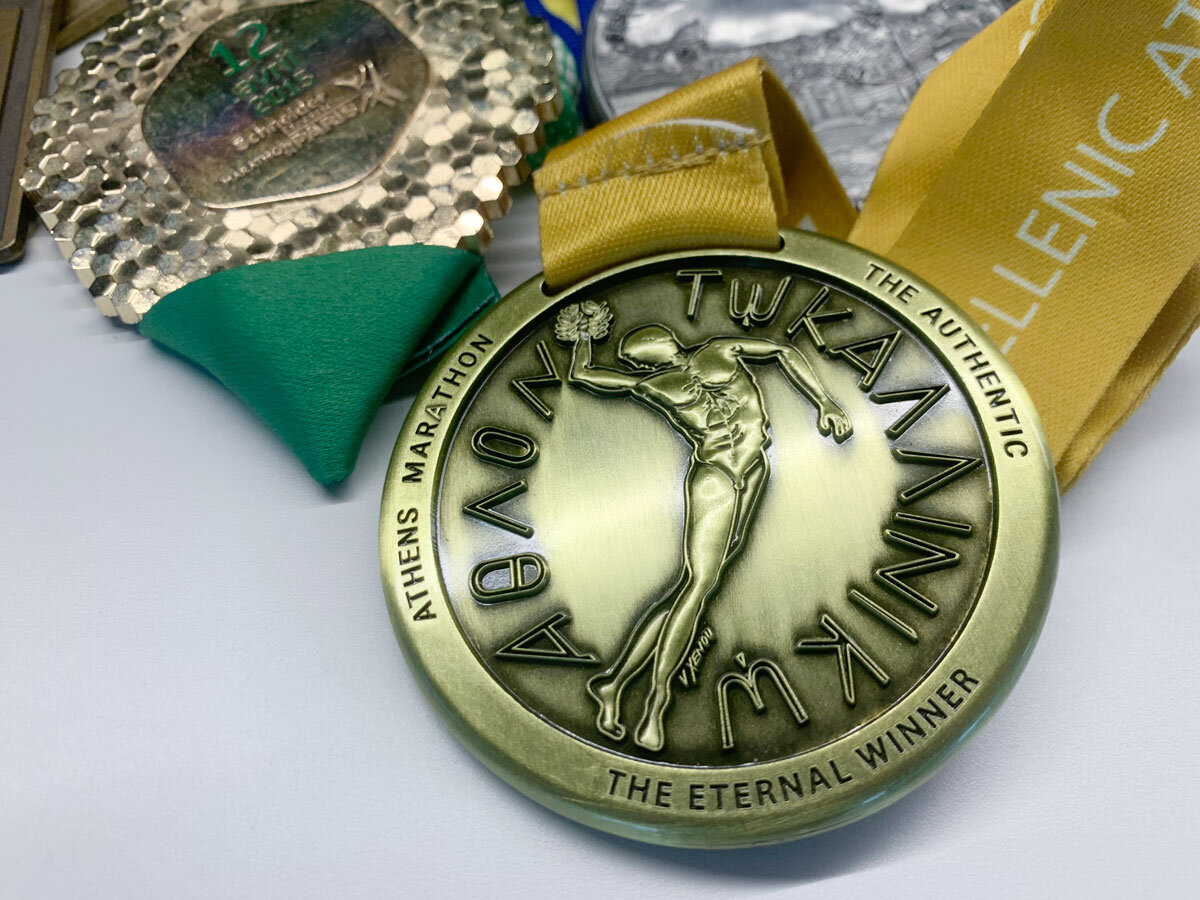
El first Olympic marathon was held in 1896 (one year before the Boston Marathon) on the occasion of the celebration in athens of the first modern Olympic Games.
History tells us that Pierre de Coubertin, who was the creator of the modern Olympic Games with the idea of remembering the Olympic Games of antiquity (held between 776 BC and 393 AD), received the suggestion of doing a long-distance race inspired by legend of the warrior-messenger Pheidippides, who ran from Marathon to Athens to report, just before he died, that the Greeks had defeated the invading Persian army at the Battle of Marathon.
The great atmosphere that exists in Athens is transferred to the spectacular runner's fair that celebrates the test. I have been to numerous important marathon runner fairs and I can assure you that the Athens marathon is one of the ones that impressed me the most. It installs at the Faliro Sports Complex, a grand sports facility that hosted the handball, taekwondo and volleyball competitions during the 2004 Olympic Games.
It is a fair in which you can spend hours and hours visiting stands of countless sports brands of clothing, accessories, gadgets... and in which many other marathons are also exhibited to attract participants, aware of the very high percentage of runners from all corners. of the world that meet in Athens.
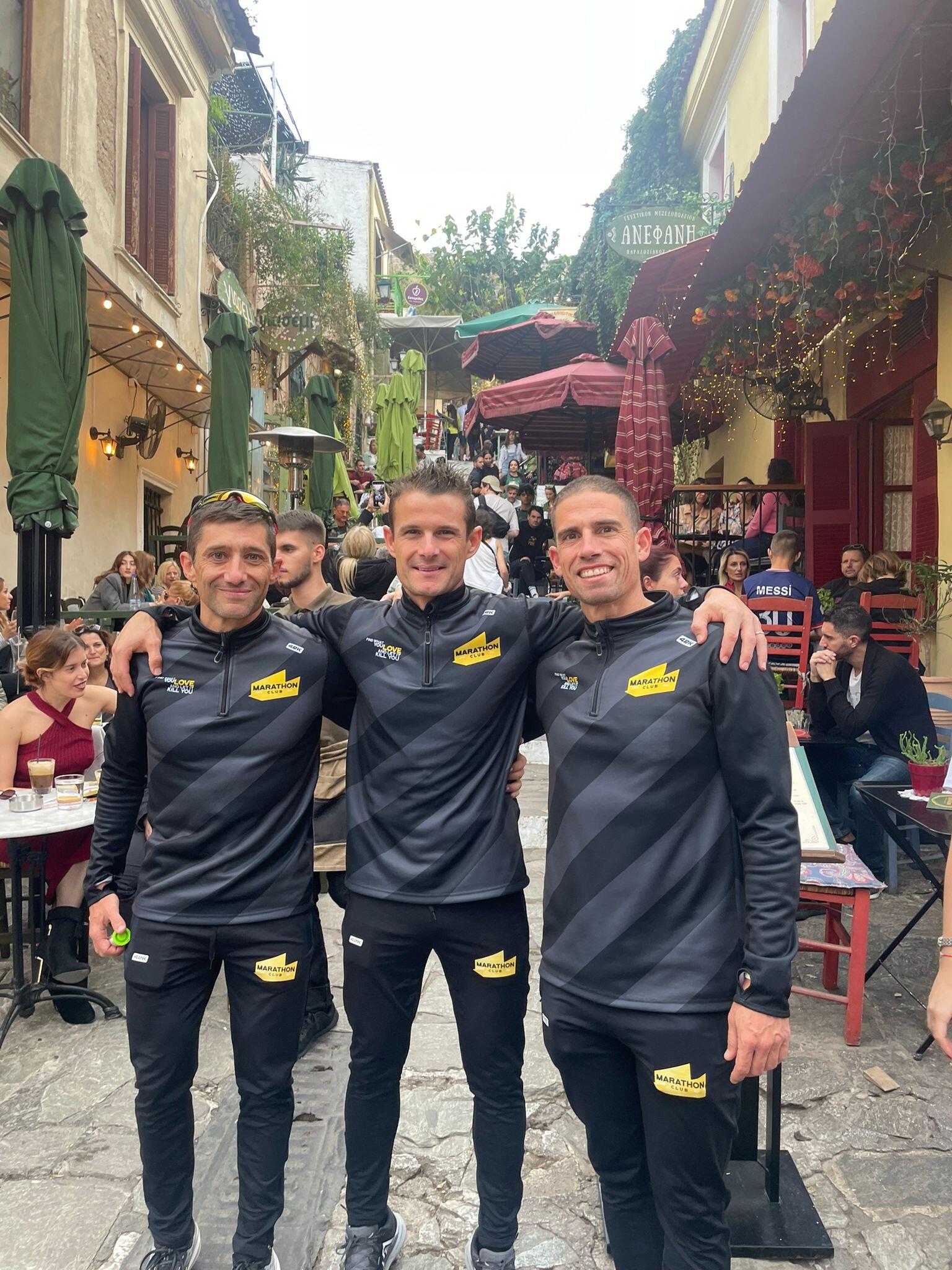
An amazing and impeccable organization
Race day starts with a important early morning. You have to set the alarm very early to catch any of the hundreds of buses that take you to the starting line.
The device of hundreds and hundreds of buses that Twenty-something thousand runners are transferred from Athens but also departure in the town Marathon (marathon is the Greek word for fennel, a plant that was abundant in the area), which is found about 40 kilometers (the distance that according to legend Pheidippides traveled in the opposite direction).
From 5:30 in the morning the streets of Athens are abuzz with people and buses. It's a mammoth deployment of buses, perfectly distributed throughout different areas of Athens and with previously established departure times.
I have worked in race organization and I know the difficulties involved in organizing an event for more than twenty thousand people. It is very difficult to imagine the extraordinary complexity of organizing the bus journey from Athens to Marathon for more than twenty thousand people and doing it with such professionalism and in such a fluid manner.
I must admit that I did not expect to find a career with such a professional and efficient organizational level; all, absolutely everythingIs perfectly organized so that around 7 in the morning, two hours before departure, all participants are already in the town of Marathon.
Another example of perfect organization is the wardrobe that is installed at the exit. A huge team of people from the organization is in charge of collecting the bags and backpacks from the participants and they are immediately transported by trucks to the finish line in Athens, where a multitude of volunteers classify them by number to facilitate collection after the test.
The Marathon start, a moment of great emotion, excitement and nerves
We arrived at the town of Marathon at 7 in the morning and there are still two hours until departure. He atmosphere in Marathon It is spectacular: a mix of emotion, excitement and nerves. And that feeling increases as the departure time approaches. There is hardly any audience, but it is not missed because the animation of the test is responsible for generating enormous expectation and creating an atmosphere of great emotion.
I had the opportunity to talk to runners of different nationalities who were also making their debut in the race, most of them with many marathons under their belts, and all of them admitted feeling a special emotion, a mix of feelings that they had not experienced at the start of other big marathons.
When the time of departure is close, the organization's animation does not stop encouraging the participants. The moments before departure make your hair stand on end.
A unique route due to its hardness and demand
I had thoroughly studied the route and knew that I was facing a complicated and very demanding route. So it was. Without a doubt, it has been the hardest marathon I have ever run.
The first 10 kilometers are flat and they are completed easily, but from there the real Athens marathon begins. I remember going from the start behind two Greek runners who, upon reaching kilometer 10, high-fived each other and wished each other luck; They knew, probably because they were not beginners like me, at what exact moment they had to start gritting their teeth to face the race.
When you leave kilometer 10 behind, the road heads towards the sky. Until kilometer 31 the terrain is constantly ascending, with the occasional short section of descent that deceptively allows you to recover (keep a rhythm or a controlled pulse becomes impossible task). There are five thousand especially hard, from the 26th to the 31st, with very demanding ramps that require correct dosage of forces because it is very easy to make the mistake of forcing and pay dearly for it later.
From kilometer 32 the tour is softens because the descent towards Athens begins, but the difficulties are not over. To face the descent you have to be very strong quadriceps because otherwise you can have a very bad time in the last ten kilometers.
Between 34 and 36, you begin to notice very significant muscle fatigue, which is the result of so many kilometers of climbing and the change of support when running that requires you to make the descent. At that point in the race is when you are very grateful for having done specific strength work for this test.
The last kilometers can be tortuous, very tortuous, without adequate muscle preparation. At the Athens marathon the famous wall may be higher and more dangerous than in any other 42 kilometer race.
The Athens Marathon requires special preparation
The route approaches the 400 meters of accumulated positive slope and 80% of that climb is concentrated between kilometers 10 and 31. It is a marathon in which it's very difficult to pick up the pace, except in the first ten kilometers. There are sections of the route with very hard ramps that require a special level of physical and psychological preparation.
In my opinion, the Athens marathon It cannot be faced with the same preparation strategy as for a flat marathon. like, for example, Valencia or Seville. Without a doubt, you have to arrive with a very significant volume of kilometers in your legs, but I dare say that it may not be enough to be guaranteed of crossing the finish line in Athens. This race requires special muscle strength preparation and also extensive previous experience in marathon distance.
Without very well-planned strength work focused on the hardness of this race, the Athens marathon cannot be tackled safely. If you have any muscular weakness, it can be very difficult to finish.
Emotion overflows upon arrival at the Panathenaic Stadium in Athens
If I had to stay with an indelible memory of the Athens marathon, is without a doubt The entrance to the Panathenaic Stadium in Athens.
At kilometer 42 there is a curve that places you in front of the entrance straight to the stadium. At that moment the senses are not able to process everything you see and hear. The emotion overflows. Suddenly you see yourself running inside the most legendary stadium in sport. The stands are very high and are full of people applauding, cheering, shouting... You look up and feel overwhelmed with the spectacle. It doesn't matter how you imagined that moment: reality exceeds any expectations.
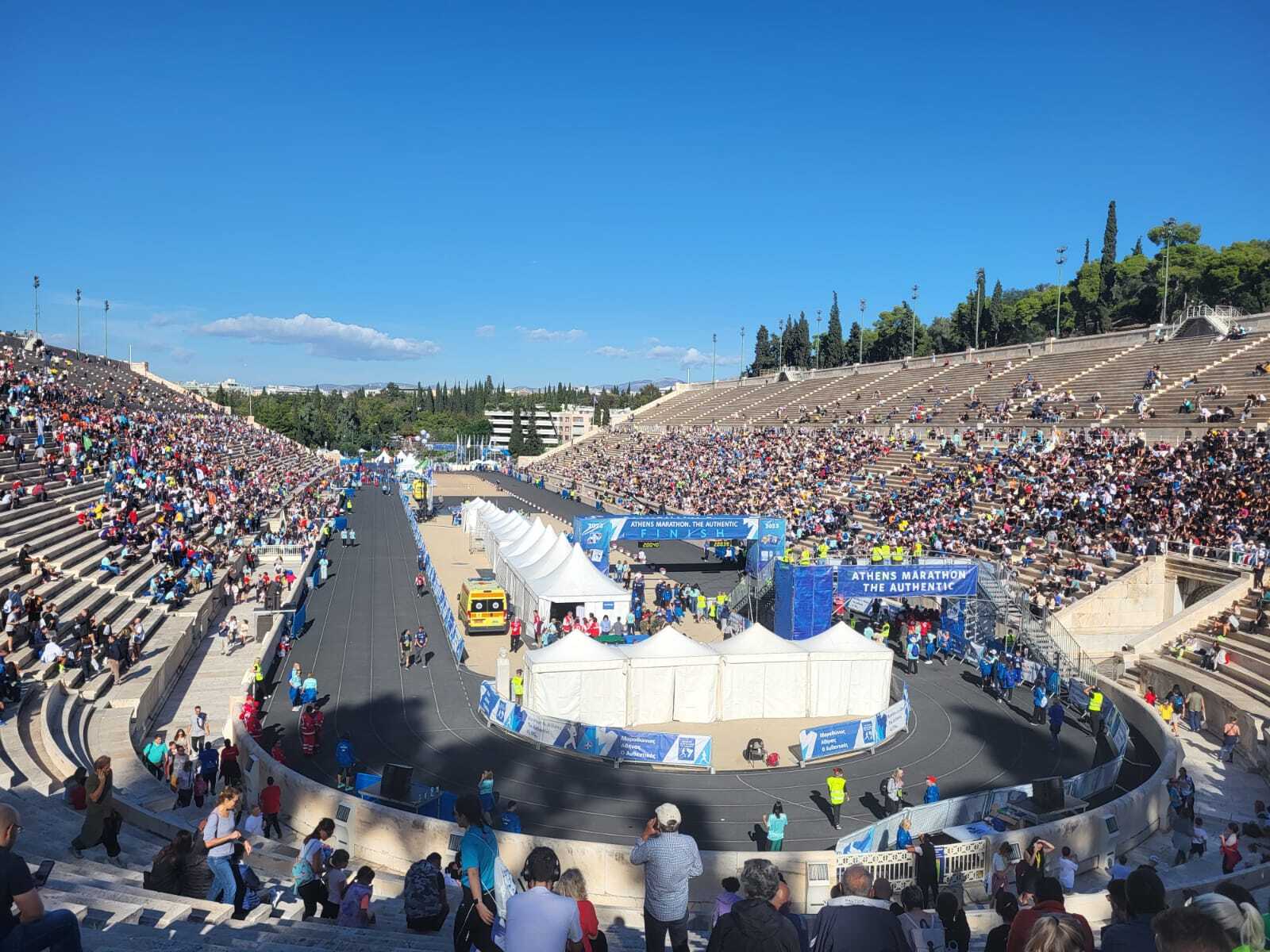
Panathenaic Stadium also known as the Kallimarmaro (what in Greek means "beautiful marble" because it is built with white marble), in 1896 it hosted the first edition of the Modern Olympic Games after having been rebuilt on the remains of an ancient stadium dating back to 329 BC
It is located in the center of Athens and is reached after a journey of about 2 incredible kilometers through the streets of the city. The number of people waiting in Athens for the arrival of the participants is incalculable. The emotion felt in those two kilometers neutralizes any feeling of tiredness, any discomfort. Everything you have suffered is compensated. Is the warmth of the Athenian public is impressive and how they encourage you to fly you to the entrance to the stadium.
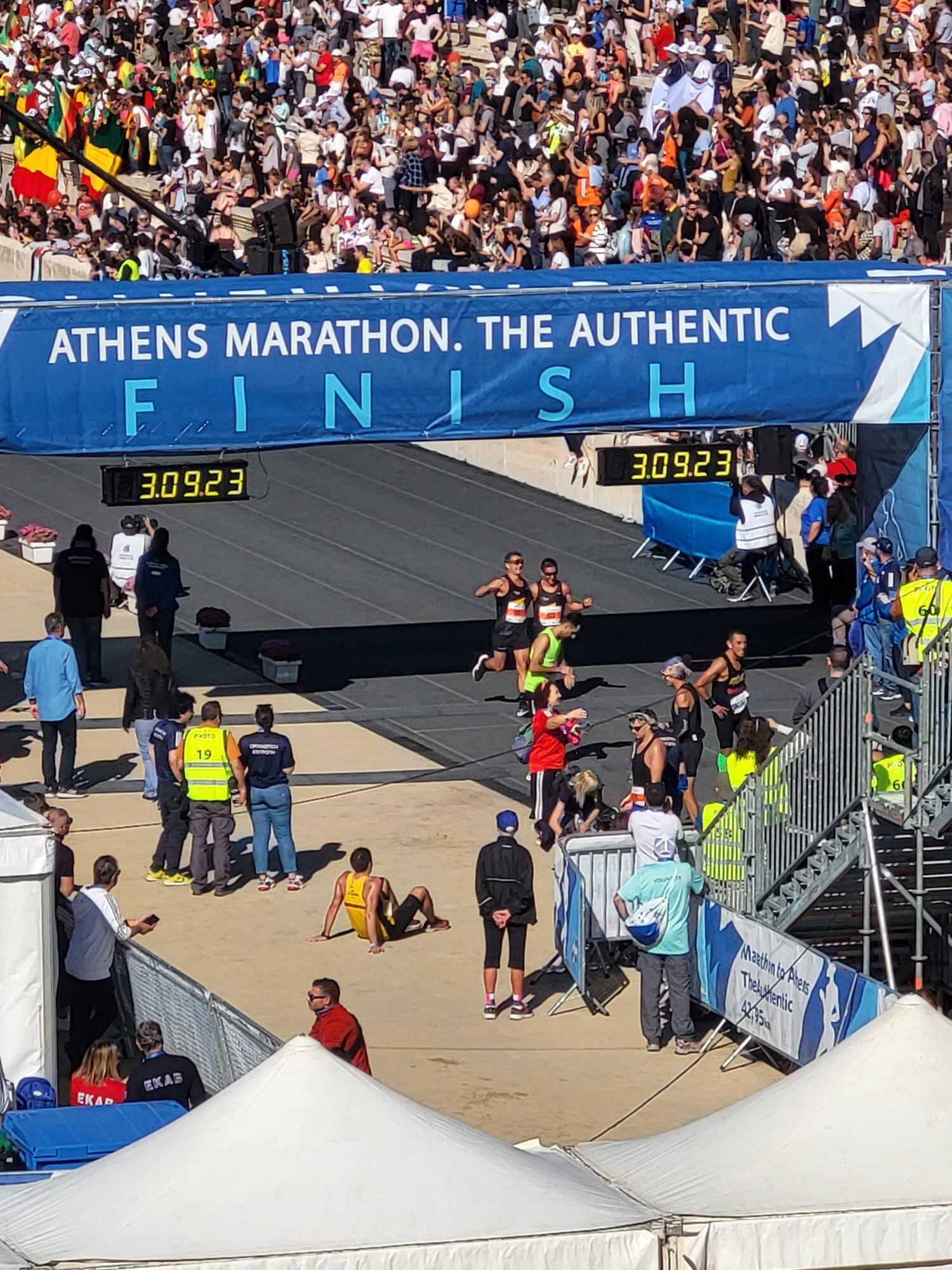
Athens is a marathon different from the rest of the big marathons
The Athens Marathon It is different from the rest of the big marathons in many things. Has numerous features that make it unique and some of them, in my opinion, reinforce their uniqueness and authenticity.
A priori it may seem less attractive because it has a series of “drawbacks” that do not occur in other large marathons: the huge early morning on race day, trip of almost an hour to Marathon, a tour with more than 20 kilometers of ascending terrain (the longest uphill hill in a marathon race) or run without an audience for most of the race.
In any large marathon, the presence of the public throughout the entire route is common, but in the Athens marathon this is not the case. There is an audience at the beginning, at the start of Marathon, but as soon as you leave this town and head towards Athens the race runs along a kind of national highway without public, except when passing through towns like Nea Makri, Rafina, Pikermi... in which all the inhabitants take to the streets to cheer with great enthusiasm, offering olive twigs as a way of wishing good luck, dancing Shirtaki, which is the Greek popular dance par excellence …
The public concentrates in the towns through which the race passes and at the end, in Athens, but there are almost 80 percent of the route in which one runs without public. Perhaps that may seem strange or be an inconvenience for someone used to running marathons with animation at every kilometer and with the presence of the public throughout the route; It seems to me that running alone for so many kilometers gives this race a special appeal.
The Athens Marathon forces you to face the true loneliness of the marathon runner, the famous distance runner loneliness. The marathon is a sporting event that requires mental strength and in a course like the Athens Marathon you test your mental strength like in no other marathon, at least like in no other that I have run.
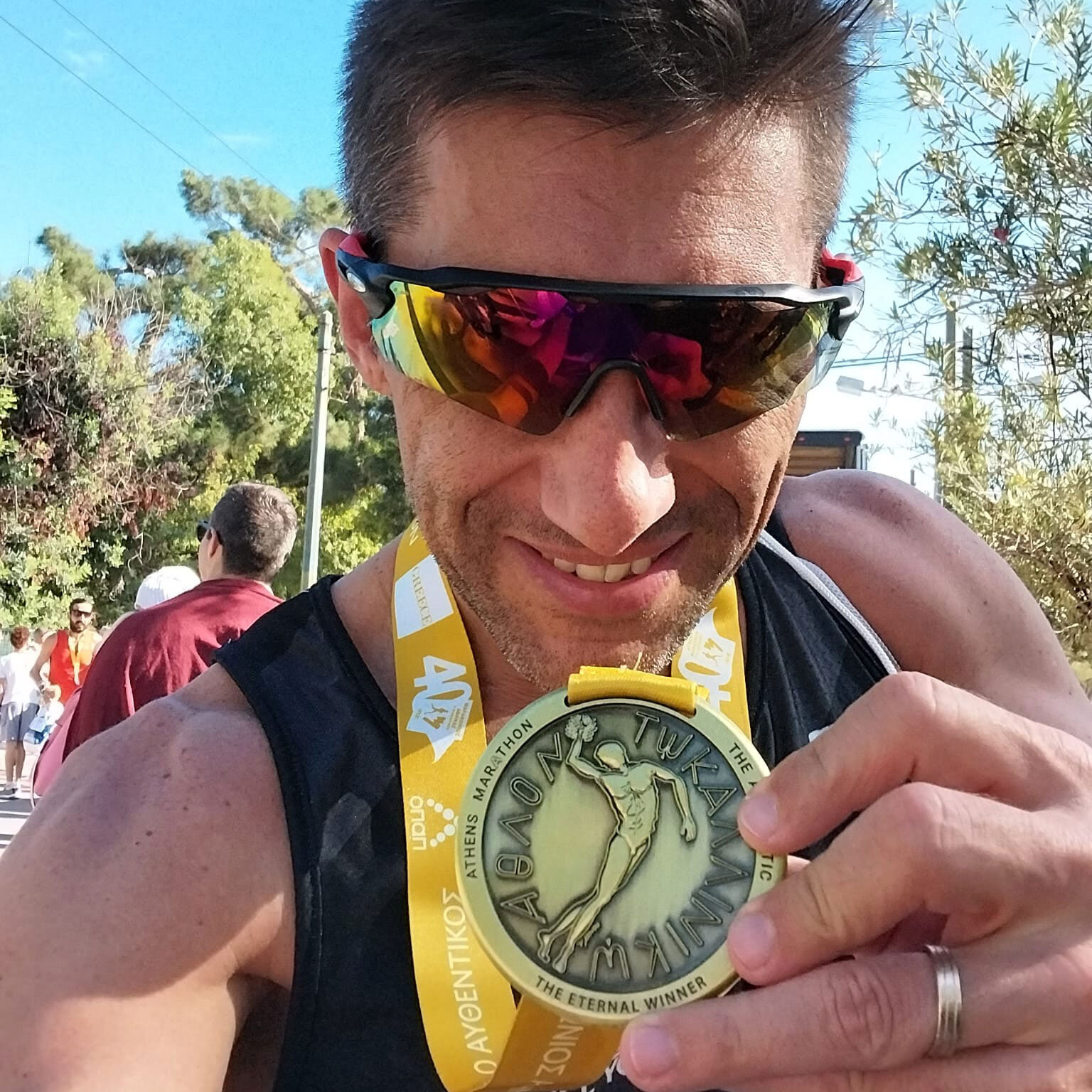
The times of Abel Antón and Martín Fiz in the 1997 World Cup, a feat
After having run the Athens marathon and having suffered its hardness and demands, I consider the times set by Abel Antón and Martín Fiz in the 1997 Athens World Championships a true feat, 2h 13m 16s and 2h 13m 21s, when they became champion and runner-up of the marathon world.
The records of Antón and Fiz in that world cup they are amazing. When you know the route you give much more value to what they did. It is a brutally demanding leg-breaking route. It seems almost science fiction to me to think about running at such high paces on a route like the Athens Marathon.
In all my participations in marathons I had managed to be sub 3 hours (except in Stockholm in 2018) and with that ambition I started the Marathon, but the race put me in my place. In the end I stopped the clock at 3h 09m, a time that I celebrate with the same enthusiasm as any of my best times (2h37m and 2h42m in Valencia 2013 and Valencia 2012, respectively).
I have fulfilled a dream. I have crossed off what has always been the marathon par excellence for me from my bucket list. I have lived the most exciting finish line of my life and i have accompanied by two great friends, Borja and Carles, to whom I am united by many races and many kilometers run, but from now on, we are also united by having lived together the experience of the great Athens marathon, the authentic one.
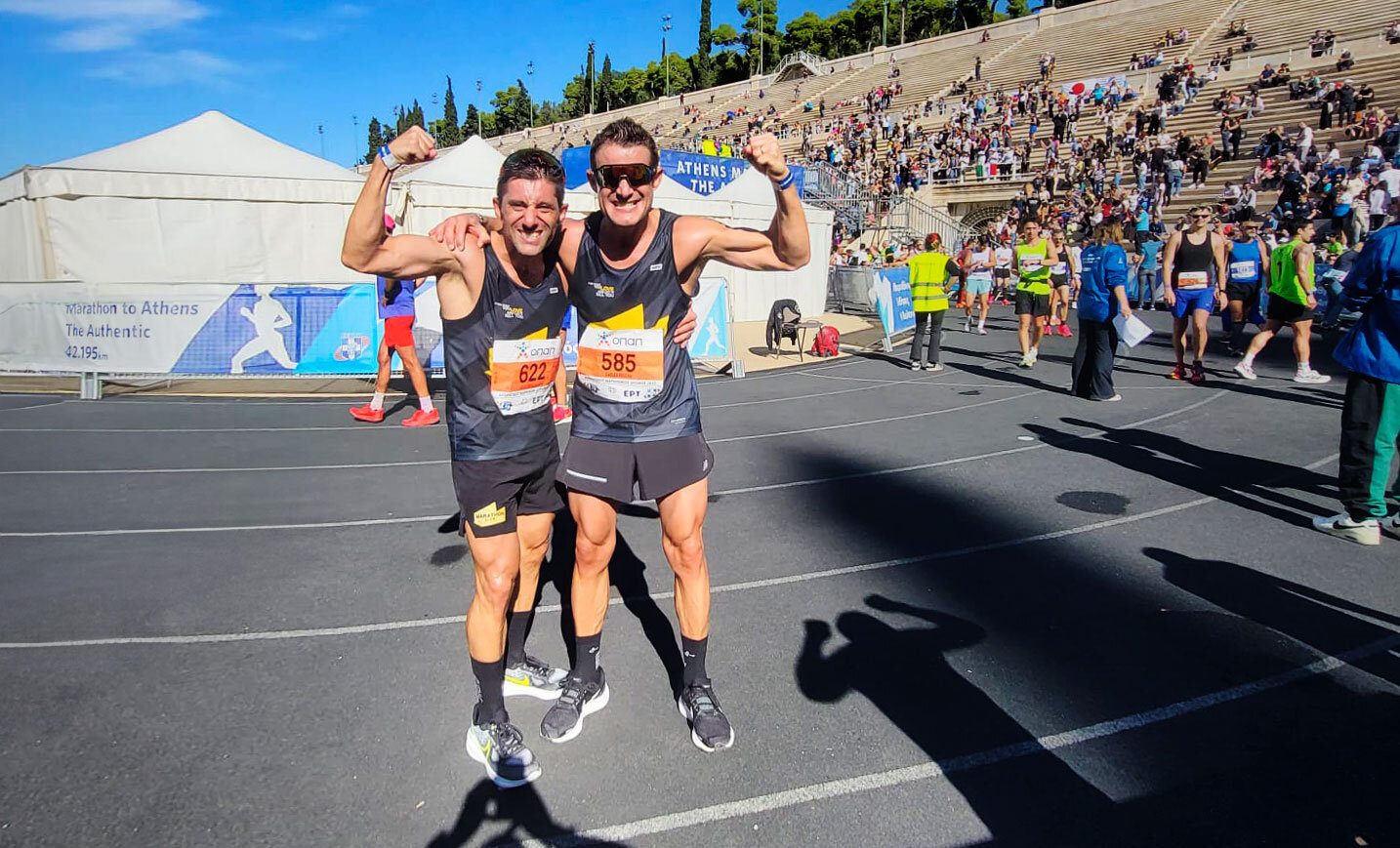
Two other great friends, José Luis and Chema, should have also experienced it, but due to different personal circumstances they could not. I hope and wish that one day we can form the five, as planned in 2023, at the Marathon starting line and face together the 42,195 kilometers with the most history. I trust that life will allow me to once again enjoy the unique experience of running into the Panathenaic Stadium in Athens.
I heartily encourage any runner who loves the marathon to dream of competing in the Athens Marathon sometime in their life.
We could say what to drink carbohydrates for running a marathon It is equivalent to getting the fuel you need to do it. They are in charge of contributing to the muscles, the brain and the organs energy that they need in any circumstance.
Therefore, in the face of such a considerable effort as participating in a test of this type, it is essential that you do a good store of carbohydrates.

Otherwise, your body will look for a substitute and will start to use other sources of energy such as proteins, necessary for other functions of the body. Once these are consumed, you could even suffer a blackout or other health problems.
Carbohydrates in sports nutrition and bodybuilding
Consequently, carbohydrates are essential for any sports activity, not only for running marathons, but, as they require so much wear, they become even more necessary.
Once consumed, carbohydrates are broken down into glucose by the action of an enzyme called amylase and it is precisely this glucose or sugar the one that provides energy to your body. However, there are different types of carbohydrates and not all are equally beneficial. The healthiest are those that come from whole grains, vegetables, fruits, dairy products, and legumes.
Going deeper, we will tell you that they exist, basically, two types of carbohydrates: simple and complex. This division is made according to its structure and depending on how quickly the sugar is digested and absorbed.
The former are made up of just one or two molecules, which means that they are quickly absorbed into the bloodstream. Consequently, they cause an equally rapid increase in energy. However, that peak of force can disappear, in the same way, in a very short time.
More beneficial for the sport are the compounds. Made up of many molecules, they are absorbed more slowly by your body, in such a way that their energy supply is produced in a slower but also longer lasting way. In addition, they provide other beneficial elements for your diet such as vitamins, fiber and minerals. This type of Composite carbohydrates (also known as “starchy”) are found in alimeFoods such as pasta, rice, cereals, fruit, potatoes or vegetables.

Proteins
On the other hand, if you are preparing to run a marathon, you should also take into account the consumption of proteins. The reason is very simple: they play a fundamental role in rebuilding muscle damaged by exertion. Recommended products in this sense are the chicken and turkey meats, eggs and dairy.
If you are training for a marathon, you should eat 1,2 to 1,8 grams of protein for every pound of your body weight. Finally, it is advisable that you eat two hours before starting to run.
In conclusion, it is essential to consume carbohydrates for running a marathon. You will also need to hydrate constantly and have good shoes and light and breathable technical clothing such as 42K Running, which you can find in your Online store.
Exercise requires a healthy and balanced diet that provides the necessary nutrients for muscle development. The running on the other hand, it requires considerable physical effort, especially in the face of prepare a marathon. That is why the daily menu should be taken care of more and incorporating elements that facilitate this effort, such as the whole grain, alimeunhealthy and that will facilitate the race.
The best cereals for a runner which follows a Healthy diet
1. Brown rice
Not only will it offer a great supply of energy to the body, it will also help regulate the digestive system and eliminate toxins.

2.Kamut.
It is the turgidum wheat variety, from Egypt. It differs from the other varieties of wheat in that it has 30% more protein than the rest, in addition to other components such as multiple vitamins and minerals.

3. Millet.
With this cereal you can enjoy a crucial aspect for metabolism: 25% of the RDA for magnesium.

4. Quina or quinoa.
As with millet, specifically with 65% of the RDA.
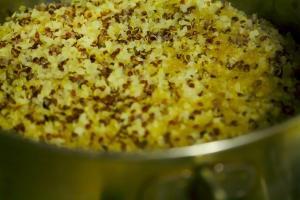
5. Teph.
With a mild flavor, this cereal, in addition to providing energy, is also an important source of iron.
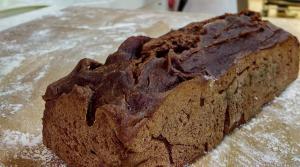
Why cereals?
Cereals are fruits that differ from the rest because they are simultaneously grains and seeds that can be eaten.
For centuries, they have allowed human beings to advance and evolve, since they have been their main and primary sustenance. To this day, they constitute the base of the nutritional pyramid and they are basic in a healthy and varied diet. In addition, they are especially important in the meals of people who practice intense sports such as cross-country cyclists or marathon runners, due to their great energy contribution.
On the other hand, these cereals are complex carbohydrates, that is, in addition to satiating the appetite, they are a constant source of energy, as if it were gasoline in a tank. All this is given by the starch that the seeds store in order to grow. It is also worth mentioning the vitamins, minerals, fiber and proteins (especially beneficial if consumed with legumes) that they contribute to the body.
Prepare a marathon: eat properly
As has been said before, thelimentation is crucial for a runner. But when and how to carry it out?
1. Never go for a run on a full stomach. At least 3 hours must elapse.
2. Avoid trying tolimenew ones before the race, since you don't know how your body will react.
3 Hydrate constantly before the marathon.
4. Eat carbohydrates that do not provide too much fat, such as whole grains.
5. Avoid overdoing it with sugar. these tolimentos delay digestion. In addition, they can cause low blood sugar.
6. The last supper. Dinner before a marathon is crucial, it must be rich in carbohydrates and abundant, although always avoiding digestive problems during the night.
Whole grains represent a alimeunhealthy and highly beneficial for our body. Sport will lengthen our lives, but it is not the only thing that matters: taking care of ourlimentation should be just as important.
My internal competition device was activated 2 hours before, when the ritual of dressing for the occasion begins. You know that you are dressing for a battle, where you must put on the greatest "shields" to defend yourself and reach your goal.
Bananas, salt capsules, a lot of water, some gel in the bedroom, compression stockings, a visor, Vaseline, cut nails, sun protection, glasses... and endless other things.liments and accessories that together make us feel more sure of ourselves.
Faro de la Mola: starting line, incomparable setting, infinite sea. Unconsciously I start to look at the runners, looking for those who at first glance seem more trained to me, there are a few seconds in which it seems that I am playing the world championship and I have to analyze my rivals, and as always happens to me, I see a lot level. Clear strategy, I have not prepared this half marathon, but I want to do my best. I don't know if my hamstrings on my left leg will hold me, which always tend to give me war and I plan to control and be cautious until km15 and from there decide.
EXIT! Traffic jam, everyone trying to get a place, every second seems to be worth it. I join the practice of 1:30 thinking more about muscle pain, than about the race. The mental game begins, each race is a similar but different game, always the same players, body and mind, different scenarios, same rules, but different weapons, depending on in what conditions you have arrived at that competition. On this occasion, I was expecting pain, which in the end did not manifest itself, but which kept me in a somewhat absurd state of searching for it throughout my career.
When you are touching your threshold, you have time to see many things, footsteps, cadences, and above all you see too happy rhythms that little by little are lowered.
Descent zone, curves, incline and retention, I know that my quads are going to overload, but they will complain the next day. I continue to control, the views are beautiful and you say to yourself: “¡¡Kid, are you in Formentera!”. Now up, units are beginning to drop down, I hear too rapid breathing and I think that at that level of effort the race can be very long.
I keep devouring km, without going above 170 ppm maximum and a controlled cadence close to 180, I have everything very controlled, very close to the practice of 1:30, without worrying much about the partials per kilometer, I want to get to 15 and decide.
We arrive at km14; Refreshment and time to decide, I press my inner "cheking" button and begin to check the general muscular state, calves, hamstrings, quadriceps, adductors and well, everything hurts in general, but nothing is limiting or worrisome, so, Decision made: ROCK AND ROLL.
I approach the practitioner and ask him what difficulties we have left, I am about to say goodbye, but I think it may be pedantry that can later take its toll on me and I decide to put 5º without more and there I go, I start to raise my heart rate until I stabilize at 180 and there I stay.
I'm fucking runners who either stare at me in "Where did this come from?" or directly they release me or encouragement or some: “collons nen”, that motivates me more, I have activated the chase mode and nothing will stop me… not even the aire!
I'm going to a 3:50 mean, catching up with runners and thinking about the next one when I overtake them, then the salt flats arrive and there the aire is very strong, but the aire is strong for everyone, so I clench my teeth and continue, I already surpass the 180 ppm, but I know I have 2km left and although now even the rubber of my sock hurts, not slow or dead, I shoot, shoot, shoot, I see the Garmin and in the end I verify that I'm going to do better time than I thought: 1 hour 26 min and place 38 of the general.
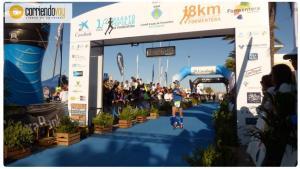
Finish line, I hear the encouragement of my colleagues who are cheering us on, I see the chrono, the carpet and I think: you already have it, It is time to tighten the knot of the tie and put out chest for the photo.
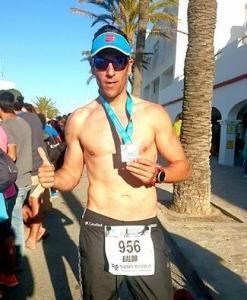
Happy, tomorrow everything will hurt, I think. But that is another story, a story that is suffered in silence and with honor.
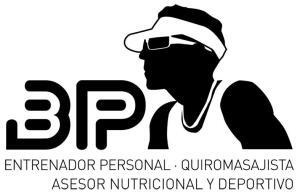
The “different” reasons why women and men decide to run their primera a marathon
It seems that the gender difference haunts us even in the reasons why women and men decide to run a marathon. The most widespread popular belief is that women the reason for putting on running shoes for the first time is related to taking care of your image (lose weight) and improve your mood by finding a source to relax while at the men, what drives them to go out for a run is the emotion associated with competition.
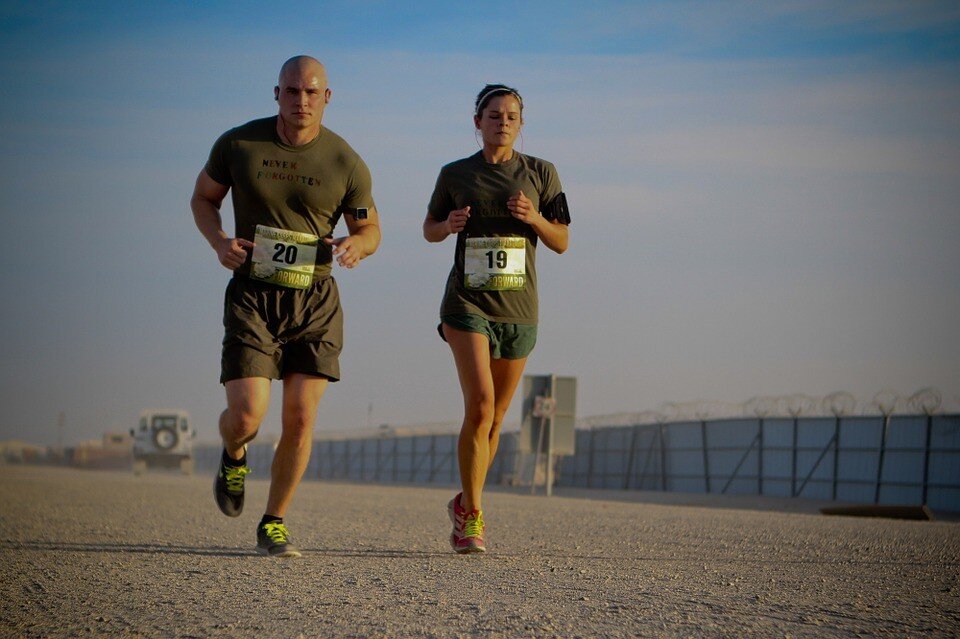
However, and according to the results of the Elizabeth Loughren study carried out at Temple University in Philadelphia (United States) and presented at the annual conference of the Britisch Psychological Society, the reasons are more complex.
The study consisted of passing an online questionnaire to 900 people who had run a marathon for the first time a short time ago. Some of the questions in the questionnaire were of the type "What had motivated you to join a marathon?" "Did you plan to join another marathon?" and if the answer was affirmative, "Why did you want to repeat it again?"
Two compelling reasons to join a marathon and regardless of gender, since they were common responses in both women and men, were "to feel proud of myself" and "to finish the race in a specific time." .
Where if there were differences is that while in the women's responses the Two reasons The ones that most frequently appeared were those of running to improve their mood and of wanting to lose a few kilos for their wedding or any other special event marked on the calendar; in men's the winning reason for running marathons was to see how fast they could run.
Regarding themselves to repeat themselves, a slightly greater number of men confirmed their willingness to participate again in another marathon with the desire to improve their personal brand.
According to researcher Elizabeth Loughren (a regular marathon runner) "For women, the marathon may be more about the experience than the competition itself" and points out that “"When I talk to men about running a marathon, they often ask me what my time was or where I finished, while women will ask me how I felt."
Evidently, the gender factor is only one of the many factors that influence the reasons for deciding to undertake a marathon, and this is pointed out by Dr. John Kremer, sports psychologist at Quenn's University in Belfast (Northern Ireland). : “Age, for example, can play an important role in your motivations to participate in a sport. "Younger people are more likely to be motivated by competition, but the motivation of older people is generally related to health."
Regardless of what your main motivation is for making your debut in a marathon, and whether or not it coincides with that of your partner, the important thing is that you do share the illusion of being able to play a test together that deserves great respect and celebrate at the finish line having enjoyed the road as well as the goal in which so many training sessions have invested.
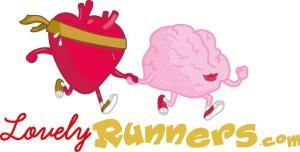
Every runner who faces the mythical distance of the 42 km exerts before a both physical and psychological preparation. Everyone has heard about what “running against the wall” is, they have heard a thousand and one anecdotes of runners who have come face to face with that concrete wall, some of whom have been able to face it and others by On the contrary, they stayed on the road, finding no shortcut to skirt the WALL. Our friends from lovelyrunners they explain to us what the wall is.
What is the wall, what is the cause? Why at km 30?
The wall can be defined as the physical fatigue y mental which makes us have to slow down the race and even abandon it in the last ten kilometers. The reason for this is that the glycogen reserves in the body come to an end and the body, in order to continue functioning, uses fat reserves, which cannot be burned as efficiently. That is to say, it is due to the transformation of carbohydrates, which are consumed quickly and as an average runner can store more or less about 2.000 kilocalories in his body, these kilocalories are depleted around kilometer 30. Note that not every runner You necessarily have to go through this experience, as there are multiple factors that influence it, such as the percentage of body fat, weight, speed and physical condition.
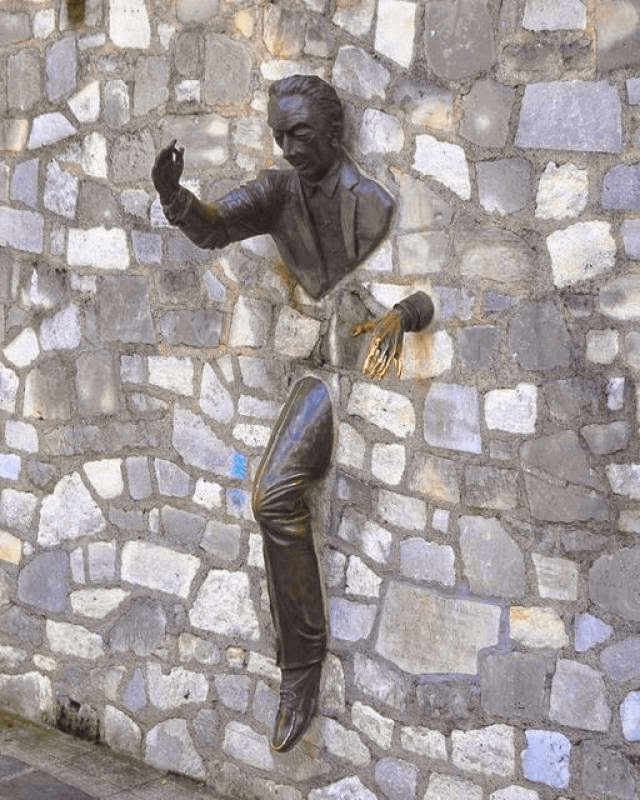
Because without a doubt prepare psychologically (as well as physically) for the possible collision with the wall increases the guarantee of being able to beat him, here are some tips on how to train the mind and that psychological techniques you can use to go out airencounter bear.
Without a doubt, just as we train the physique we also have to train the mind, and a strategy for this is anticipate the consequences, so that if you manage to familiarize yourself and adequately handle the various sensations that you will have to deal with during the marathon, the satisfaction you will experience will make it easier for you to cross the finish line. For example, you should not fall into the trap of believing that the feeling of freshness that accompanies you during the first kilometers of the race will be eternal, or when due to the pelotions, you accelerate your pace and find yourself more tired than expected.
You must pay special attention to the last 10 kilometers of the race, you have to avoid falling into self-criticism and self-reproaches; the only thing you will achieve is that you sink more easily. If you feel fatigue, if a stabbing pain accompanies you from km X, if your helmets have run out of battery, if you go at a much lower rate than desired ... if you focus your attention on it, the wall will appear for sure and your performance will be drastically affected.
Then, what can you do? Well, in the situations described above, it will be useful to use some of the following sports psychological techniques in order to achieve mantener your level of concentration during the race.
- Breathing techniques which are essential to reduce anxiety levels.
- Relaxation techniques like Jacobson's Progressive Relaxation Technique (one of my favorites) that will help you control the level of activation.
- Visualization techniques like imagining crossing the finish line in good physical and psychological condition.
- Elaboration of thoughts positive, control of thoughts.
- Meditation Techniques where positive thoughts will increase your confidence to finish the marathon.
- Crafting of a career strategy.
Finally, note that you have to have Trust in oneself, but be careful, you have to know how to find the balance so that this self-confidence does not turn against yourself, and in this way let's overestimate our possibilities which opens the way to failure and abandonment.
Remember prepare your mental level It is one of the factors that will determine to a great extent whether you travel those 42 km or not, especially in the face of the dreaded wall of km 30; the self-assertion and willpower they are a guarantee of success.
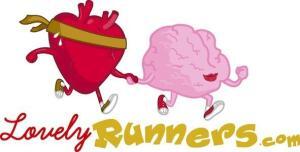
Una marathon carries behind months of preparation, but not only in what to workouts or physical exercise it means. The eatingIf possible, it is even more important than the daily routine itself. Here are five basic tips for runner that you have to take into account:
- First of all, you must consume a big number of carbohydrates to recover as soon as possible the muscle glycogen, the raw material of the broker. Therefore, in particular, both just before and after the trainingYou can have anything from bread or pasta to rice or potatoes. Fruits, legumes or juices are also rich in carbohydrates.
- To give you an idea, if you weigh 75 kilograms, 450 to 600 grams of carbohydrates per day are recommended. In the days of running intense, you should increase the intake by 150 grams. For women weighing around 50 kilograms, between 300 and 400 grams are recommended.
- All the proteins are other keys to the sports nutritiona. In addition, these must come from 100% organic products, such as meat, fish, dairy or eggs. They are recommended, in particular, to avoid muscle damage, combat oxidative stress and balance energies.
- Also, to combat the usual iron deposit drops, 15 milligrams per day are necessary. This mineral is found in abundancelimentos, such as cheese, seafood, beef and pork, or green leafy vegetables. We talked about this topic in another post. «Iron in the diet of runners»
- Good hydration plays a fundamental role in days of intense physical exercise. Therefore, it is important to drink immediately before starting the race (two to three glasses of water) and during its course. A jerrycan on the waist or a backpack camelbacks are great ideas for hauling water.

By following these five basic tips, you will gain health and avoid more serious problems.
If you have been interested in this post, consult our Sports Nutrition section from this link
Featured Image Source post
For those fans of running that they consider if they are prepared to run a marathon, we indicate in this article 5 keys that they must take into account to achieve their goal and not fail in the attempt. You can do it and we will help you.
Training
The training plans to run a marathon They must be differentiated from the usual outputs. You have to combine long distances with Workout de speed and strength, being convenient to carry out some bodybuilding or toning routine.
Above all, carry out the training plan gradually, without starting directly with the full distance.
Patience
El runningLike everything in life, it requires a process. Linking this point together with the previous one, we must be clear that we are not going to achieve our goal quickly; That is why daily effort is going to be very important. Setting short-term “micro-goals” will make it easier to achieve the final goal.
Motivation
Daily effort and motivation. This part is perhaps the most important of the 5 that we name here. It is not enough to know what you want, you have to strive every day to achieve it. Having a positive and determined mind will help especially on those toughest days that arise. Small daily efforts will result in the end goal.
Diet
It is necessary to combine exercise with a proper diet, not only for the marathon itself, but also for your health. The body needs to receivelimeQuality training before exerting yourself (to perform adequately) and after the session (to recover). In addition to this, you have to drink plenty of water to be well hydrated.
Clothing
Especially the footwear must be suitable. The feet receive the constant impact of the weight of the body during the race; Sneakers with insoles and appropriate cushioning will suffice, along with comfortable sportswear.
With these keys, you will be able to gradually reach your most desired goal.
If you want to read more articles related to training plans click here and with sport Nutrition click here.
The long distance runners, for example from marathon, are at risk of low bone density, stress fractures and irregular periods, so it is important that you provide your body with enough energy for maximum performance y avoid injuries. The article we are talking about today is based on arguments from Brooke schantz, nutritionist registered and board certified specialist in sport Nutrition at Loyola University Health System, Maywood, Illinois.
Schantz offers this simple way for Corridors calculate your caloric needs: A daily activity of between 30 and 60 minutes requires 16 to 18 calories per pound of body weight. An activity of one to one and a half hours a day requires 19 to 21 calories per pound. An activity of one and a half hours and two hours a day requires 22 to 24 calories per pound. An activity of 2 to 3 hours a day requires 25 to 30 or more calories per pound.
 In this link you can consult the equivalence between pounds and kilograms.
In this link you can consult the equivalence between pounds and kilograms.
For runners, especially for those who are considering run a marathon, it is important to consult a nutritionist registered to have a personalized nutrition plan.
The following conclusions emerged from the study:
Avoid the tolimeFiber-rich snacks the night before and the morning of the race. eat that kind of aliments (such as cereals, grains, granola bars, fruits and vegetables that are high in fiber) could result in a intestinal discomfort and in suffering cramps on race day.
Watch for sweat loss and Weigh yourself before and after long runs. For every pound you lose during a run, replace it with 16 ounces of water. Checking the color of your urine is a good way to assess hydration levels. The clearer the urine, the more hydrated it is.
Consume between 30 and 60 grams of carbohydrates every hour when you exercise for more than an hour. You can consume them on the go in a variety of forms, such as jellies, candies, sports drinks, sports bars, or a combination thereof.
Consuming carbohydrates before a marathon can improve performance. There are carb provision plans that start 6 days before the race, but even if you start a high carb diet the day before the race, that can help you maintain a high intensity during the race.
All the proteins are also important for increase lean muscle mass and how it helps in muscle repair. Endurance athletes require 1.2 to 1.4 grams for every 2.2 pounds (one kilo) per day.
Make sure you stick to a schedule of nutrition and hydration prior to the marathon. Race day is not the best time to try out new racers.liments and drinks.
Source: Dyetics
I don't know how many times I've seen this arrival video and it still makes my hair stand on end. Big Gabrielle !!!
The first official women's marathon, sanctioned by the IAAF, was that of Tokyo, in November 1979, and in Los Angeles in 1984, women would run the first women's Olympic marathon, in which Joan Benoit, from the USA, wins with a time from 02:24:52, in the midst of the standing ovation of an entire stadium, as a sign of recognition. And in that competition, the public would be moved to tears seeing the finish of the Swiss Gabrielle Andersen, 39, who, arriving last and absolutely exhausted and at the limit of her forces, was not allowed to leave or receive medical assistance for fear of being disqualified , completing the round of the Stadium dragging his feet and stumbling at each step, as can be seen in this video). The vehemence of this woman made modifying the general marathon regulations, where an athlete today can receive medical assistance without being disqualified, but without being transferred or helped to move.

The sudden death of athletes has been causing great social and family commotion for years, in addition to monopolizing the attention of the media. But the great doubt seems to remain in the aire: Does elite sport really harm the heart? In the last two decades, the scientific community has been turning its efforts to find a convincing answer to this question and each time they provide more data that come closer to it.
Thus, ELMUNDO.es recently echoed an investigation that recognized that long-term endurance sport damages the right ventricle in elite athletes, creating a substrate for arrhythmias.
Today, however, researchers from the Massachusetts General Hospital (USA) have carried out a study with 10 million marathon runners between 5 and 2000 in which it is determined that the risk of heart attack or sudden death among its participants is very low. In fact, only 2010 of all of them suffered a heart attack, of which 59 died from it.
Explanations
Josep Brugada, medical director of the Hospital Clínic of Barcelona and one of the scientists who has most investigated the relationship between sport and heart damage, clarifies the discrepancies between the different studies to ELMUNDO.es: «Endurance and long-term sport could cause damage to the heart, which is why athletes who practice it, and in whom there is no evidence of previous cardiac pathology, have to undergo an annual check-up to rule out damage to the heart. However, in this latest American study, although the risk of heart attack is very low (one case per 185.000 runners), the deaths that occurred could have been avoided if the participants had undergone a prior electrocardiogram.
Indeed, American scientists, led by Aaron Baggish, acknowledge in their article: "We studied cases of heart attack (defined as those in which the patient is unconscious, with spontaneous absence of pulse and breathing, documented by health professionals) that occurred during races or one hour after competitions in long-distance (40 kilometers) or medium-distance (20 km) marathons.
Subsequently, and "after verifying the number of cardiac arrests that occurred and the number of patients who survived them (those who received cardiopulmonary resuscitation successfully and were subsequently admitted to a hospital), we investigated their personal data, medical history, risk factors and previous diagnosis of cardiac pathology. Likewise, the autopsies of the deceased runners were examined.
Without prior check
Of the 59 marathoners who suffered a heart attack, the authors only had a detailed medical history for 31 of them, of which 23 died (autopsies). The reason for death in 15 of the participants was hypertrophic cardiomyopathy (HCM), an inherited disease that directly affects the heart muscle and is commonly known as athlete's disease.
«The data shows that something is wrong in the American system because runners can do effort competitors without having been previously seen by a doctor, as shown in the research. This should not happen in Europe, where prior electrocardiograms are recommended and if something 'strange' is detected, other tests are added. In fact, the majority of deaths have occurred in participants with undiagnosed hypertrophic cardiomyopathy, which is usually detected by testing,” determines Dr. Brugada.
Other data provided by the research is that those affected by heart attacks were mostly men, with an average age of 42 years. However, mortality was higher among younger competitors (under 40 years old) than among older competitors (40 or older). "This fact is explained because young athletes who suffer cardiac arrest are more likely to suffer from HCM," insists the expert.
However, "among heart attack survivors, coronary heart disease was the underlying pathology although there is no evidence that any atheromatous plaque ruptured," the study details. The reason, according to the Clínic specialist, is that "the attack is not caused by a thrombosis but by what is known as demand ischemia in which the heart is forced and forced until it causes ventricular fibrillation," explains Josep. Brugada.
Exhibition in Boston
For the US scientists, one of the best messages from the trial is that patients who underwent cardiopulmonary resuscitation (CPR) were the most likely to survive, a relatively simple system that can be learned by the entire community. "Recognition of the importance of this technique requires a wake-up call, which is why we are offering the first CPR educational session to runners, family members and spectators at this year's Boston Marathon."
A measure that does not overshadow the need recognized in the study's conclusions by the researchers: "The rates of cardiac events have increased in the last decade among male marathon runners. "Physicians should be aware of the risk of hypertrophic cardiomyopathy and atherosclerotic disease in potential race participants."
Source: the world
Phew! Everything has already happened and we are alive. Dust, but alive. Some miracle, but alive. Many of us have recently run the marathon. Some were already veterans, but for others it was the first (and cruel and addictive) experience.
Neither one of us has been out of it. Those who least have some discomfort, stiffness, tired legs. The worst unemployed? Well, you know, those who could not cross the finish line or, what is worse, who ended up in one of the health posts.
What worries everyone the most in the weeks leading up to the race (and now) was not whether he would complete practice or whether he would be able to finish his particular challenge. What really took them away (and takes away) their sleep is what they are going to do now, that the race has already passed. This is not a strange feeling in the world of athletes. They strive to meet a goal, the test comes, they do it and they are left empty. Although it is easy to get out of this mental quagmire. With the training we have done, our physique is more prepared than ever, while our mind has been relieved of the heavy burden of meeting the challenge in mind. That is, we are free and we have plenty of powers. You just have to channel them into other goals.
Take another race, for example. We are in the middle of the popular tests season. More than 5.000 of these events are held in Spain and most do not exceed 15 kilometres.
 Well, now a few tips that you ran for on Sunday. They are very simple and can help you, who may be walking down the stairs on your back from what your quadriceps hurt. Your bodies it will take between two weeks and a month to recover, depending on your nature and the degree of training carried out. That is if you are not injured, which then will be longer.
Well, now a few tips that you ran for on Sunday. They are very simple and can help you, who may be walking down the stairs on your back from what your quadriceps hurt. Your bodies it will take between two weeks and a month to recover, depending on your nature and the degree of training carried out. That is if you are not injured, which then will be longer.
Speed up the recovery of muscles and joints by moving a little these days. It has to be done. Okay, if you're 'very sick' don't do it, but the right thing to do is jog (very lightly, much slower than running) for a little while (no more than 20 minutes), then undergo a thorough leg and back stretching session . Those who do not run, must stretch. The food these days post-marathon is just as important. We must emphasize carbohydrates, which must be ingested in greater proportion than proteins and lipids. Drinking plenty of water helps cell regeneration. An adequate quantity is three liters per day; the best place to drink it, the office.
No medicines, although a somewhat higher contribution of vitamin C does not hurt. Echinacea (herb with restorative virtues that is available in herbalists) works miracles. Although sometimes taking an aspirin with breakfast for the first few days is 'holy hand'.
Another thing for addicts. Although there are machacas that have run up to 56 marathons in a row, one per week, it is not recommended to run more than 2 or, at most, 3 a year. So, you already know if you have been hooked: think of the autumn ones, like New York, for example. While, to be limited to races of up to half a marathon. Or, much better, think of another sport.
Courage and think about the next one!
THE MARATHON IN THE FIRST OLYMPICS. ATHENS
1896
It is impossible to speak of the marathon as a race without relating it to the Olympic Games.
The Olympic Games of antiquity were sacred events and were considered the most important religious, athletic and cultural festival in Greece. For the Greeks, achieving victory in the Olympic Games was the most valuable and coveted thing. From its inception in 776 BC until its prohibition in AD 394, the Olympic Games were held every four years without interruption. Athletes from all Greek cities met at Olympia. Local judges played an important role in the Games of old. They selected the participating athletes.
They also supervised that the athletes slept on hard ground and followed an austere diet for a month of training. In the end, those who were approved traveled to the city of Olympia in a procession that lasted two days.
As today, solemn opening and closing ceremonies were held. The winners of the different disciplines received material aid from the cities of Greece. At Olympia the only prize was the crown of olive branches.
The Games were banned by Emperor Theodosius I in 394 AD, considering them a pagan rite. The longest race included in the ancient Greek Olympic Games was only 4.614 meters. The founder of the Olympic Games of the modern era was Pierre de Fredy (Baron de Coubertin) was always interested in education and believed that sport had the power to benefit humanity and encourage peace among the nations of the world. At age 31, he announced his desire to revive the Olympics, but no one believed in him and there was not much enthusiasm or support.
Coubertin was not disappointed and founded on June 23, 1894 the International Olympic Committee (IOC) in a ceremony held in the
La Sorborne University in Paris. Two years later, after great efforts, the first Olympic Games of the modern era were held in the city of Athens.
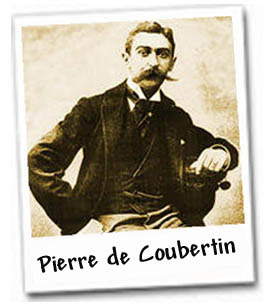
We will continue with anecdotes from the great race ……… ..
Training Plans for Half Marathon.
Beginner
Intermediate
Advanced
42K · All rights reserved

